
























OUR NXT GENERATION OF CHOCOLATES: 100% DAIRY-FREE & PLANT-BASED for all your vegan, plant-based, lactose-free & dairy-free chocolate delights!
 MADE WITH CHUFA
MADE WITH CHUFA
Managing director
Joumana Dammous-Salamé
Publication manager
Randa Dammous-Pharaon
Publications deputy manager
Rita Ghantous
Senior editor
Lisa Jerejian
Sub-editor
Miriam Dunn
Account managers
Maha Hasbani, Josette Hikri advertise@hospitalitynewsmag.com
Subscription executives
Houayda Haddad-Roumman, Mirna Maroun subscribe@hospitalitynewsmag.com
Circulation coordinator
Rita Nohra-Kejijian
Graphic designer
Ibrahim Kastoun
To advertise advertise@hospitalitynewsmag.com
Published by Hospitality Services
LEBANON
Borghol Building, Dekwaneh
Tel: +961 1 480081
UAE
HSME
Tel: +971 585098057 info@hospitalityservices.me www.hospitalitynewsmag.com
All the information disclosed in the magazine was provided by the parties concerned by each publication and checked to the highest possible extent by the editors. However, the magazine cannot ensure accuracy at all times of all information published and therefore could in no case be held responsible should any information reveal to be false or insufficient.
We welcome views on any subject relevant to the hospitality industry, but request that letters be short and to the point. The editor reserves the right to select and edit letters.
Hospitality News ME is distributed to trade professionals in the catering and lodging industry in the Middle East.
Nouhad Dammous (June 11, 2021)

Late editor-in-chief
Docteur Honoris Causa
Nouhad Dammous, the late editor-in-chief of Hospitality News Middle East, was a firm believer in the power of technology. Here, we share his words on why franchises need to integrate smart systems to improve efficiency and cut costs.
It is fundamental for franchises of the future to understand consumer needs and take advantage of the huge opportunities that exist. Technology is reshaping the F&B industry and creating new job categories. AI is already being used and will continue to be part of the franchise landscape. Indeed, many of today’s jobs will become obsolete due to automation and robotics.
The rise of social media adds another dimension. Franchised restaurants must be visible on Twitter, Instagram, YouTube, Facebook, TikTok and other digital platforms.
When we look ahead, the horizon looks bright for restaurants and the franchise industry, as firms can educate talents on new technologies and provide practical training. Attracting, developing and retaining the right talent may be a challenge, but I know that it can be achieved.
The editorial team
The Lebanese have always been savvy restaurateurs, and this has helped solidify Lebanon’s reputation as a test market for successful, franchisable concepts.

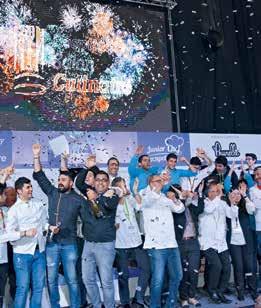

Be an entrepreneur and launch your own culinary concept

From authentic to innovative, master this internationally recognised cuisine. Launching in 2023 at Le Cordon Bleu Lebanon institute only.

Upskill your techniques and create unique desserts

















mentioned in the top 20, with Baron (No.16) in Beirut named The Best Restaurant in Lebanon.
Tunis’ La Closerie (No.34) claimed the title of Best Restaurant in Tunisia, while the animeinspired Japanese eatery White Robata in Kuwait City came in at 42, making it the Best Restaurant in Kuwait.
Skyscanner forecasts Saudi travelers' wants and expectations
The second edition of the Middle East & North Africa’s 50 Best Restaurants awards, sponsored by S.Pellegrino & Acqua Panna, recently brought together the culinary elite of the restaurant industry in Abu Dhabi, United Arab Emirates.
The event was held in partnership with the Department of Culture and Tourism – Abu Dhabi and culminated in the announcement of the region’s top restaurant, Orfali Bros Bistro (No.1). The concept was founded in 2021 by three brothers, Mohammad, Wassim and Omar Orfali, who are from Syria.
Second place was awarded to the fine -dining Indian restaurant Trèsind Studio on The Palm Jumeirah in Dubai, which is run by chef Himanshu Saini. The Best Restaurant in Bahrain, Fusions by Tala in Manama, came in at third place and received the Highest Climber Award 2023, while Ossiano in Dubai was named fourth and received the Highest New Entry award from Aspire Lifestyles. 3 Fils, which won top honors in the previous list, came in at fifth this year.
Riyadh’s Myazu (No.18) won the Best Restaurant in Saudi Arabia title. Morocco was also well-represented with four restaurants featured in the ranking, including La Grande Table Marocaine (No.27), making it The Best Restaurant in Morocco. Lebanon was also
Chef Moustafa Elrefaey, executive chef and co-founder of falafel specialist Zooba, was honored with the Estrella Damm N.A. Chefs’ Choice Award. Elrefaey’s passion for unearthing Egypt’s culinary history and using it to bring back ancient recipes has earned him a range of accolades, culminating in this prestigious award.
The Sustainable Restaurant Award was presented to OCD Restaurant (No.14).
Recognizing excellence in restaurant service and dining experiences, the Art of Hospitality Award was presented to Beirut’s Em Sherif (No.20). Artisan pastry chef Karim Bourgi, the founder of Boutique De Gourmandises, took home the MENA’s Best Pastry Chef Award, sponsored by Valrhona. Other pre-announced award winners who accepted their trophies on stage included Salam Dakkak, chef-owner of Bait Maryam in Dubai, as the winner of the Middle East & North Africa’s Best Female Chef Award, sponsored by Nespresso Professional; Anissa Helou, acclaimed food author and chef, as the winner of the Foodics Icon Award for her relentless efforts in documenting historical culinary traditions; and vegetableforward kitchen Opa, which picked up the One To Watch Award, presented to its founder and head chef, Shirel Berger.
theworlds50best.com
of quality, fine dining and passion for the culinary arts. Hoteliers, restaurateurs, executive chefs and sommeliers were present to honor the association’s milestone.

New research from global travel site Skyscanner has revealed that Saudi Arabian holidaymakers will travel significantly in 2023 despite economic uncertainty, but price-led decisionmaking will drive change. With 62 percent of travelers in Saudi Arabia planning to spend the same, if not more, on overseas travel next year, how they are going to spend this money will differ. skyscanner.net
Mind the Tech Gap by BCG X reveals companies’ tech challenges
According to research published by Boston Consulting Group (BCG), 94 percent of companies have grand ambitions to deliver substantial and rapid results from the digital transformation while companies plan to increase investment in digital solutions despite global economic headwinds. Interestingly, the majority of these digital transformations fail to achieve their objectives.
Titled “Mind the Tech Gap,” the study is based on a survey of nearly 2,700 executives driving digital transformations in companies across 13 countries and a wide range of industries. Despite a tightening global economy, the survey found that 60 percent of companies plan to increase their spending on digital transformation in 2023 compared to 2022, with business model transformation and sustainability the top two areas for future investments. bcg.com
Presided over by La Chaîne des Rôtisseurs’ president Yam Attalah, the celebration honored those who continue to contribute toward Kuwait’s hospitality sector. Mohamed Najia, a hospitality master, was awarded the Bailliage du Kuwait trophy in recognition of his decades-long service to the hospitality industry. The decorated hospitality professional has received a number of prestigious awards, including a medal of merit from Académie Française de Cuisine and a recognition award from the Kuwait Humanitarian and Friendship Society. He has also been recognized by the World Tourism Organization.
chaineq8.com
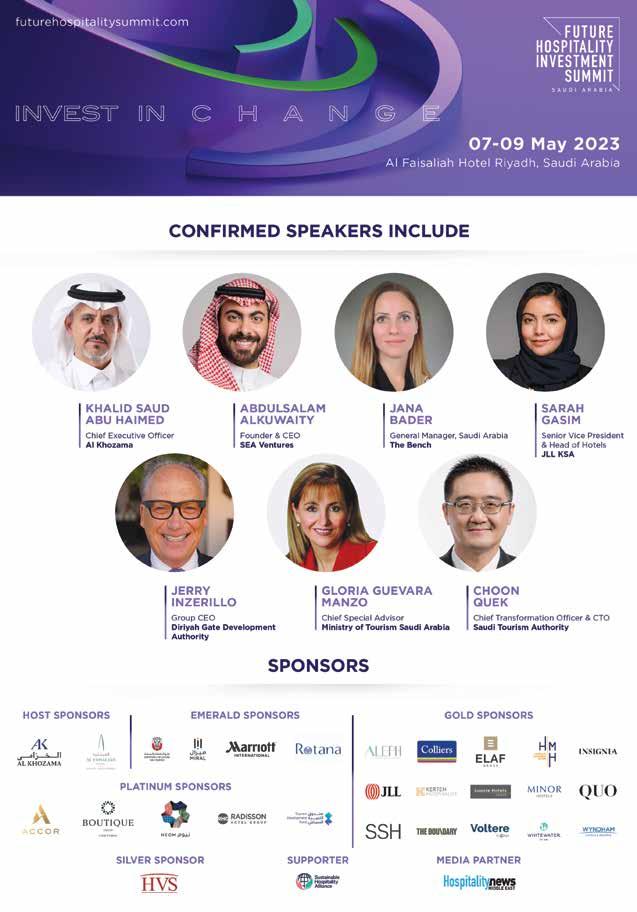
FOUR SEASONS AND BAYSIDE DEVELOPMENTS LAUNCHES FOUR SEASONS PRIVATE RESIDENCES




BAHRAIN BAY
Four Seasons and Bahrain-based real estate development firm Bayside Developments has announced plans to open Four Seasons Private Residences Bahrain Bay toward the end of 2023. The new residential offering will feature 112 exceptional homes, providing a new level of luxury in the heart of Manama.

Opening: end of 2023 fourseasons.com
Waldorf Astoria Cairo
Heliopolis will mark the luxury brand’s debut in Egypt. The hotel features 252 rooms and suites and is home to a variety of dining and entertainment outlets. It will house the signature Waldorf Astoria Spa, a relaxing pool surrounded by a landscaped garden, a fitness center, nine meeting rooms and ballrooms that can accommodate up to 2,000 guests.
Opening: Spring 2023 hilton.com
MANDARIN ORIENTAL'S NEW LUXURY HOTEL PROJECT IN KUWAIT SLATED FOR 2028
Mandarin Oriental Hotel Group will manage a luxury hotel, slated to open in 2028, located in the heart of the financial district of Kuwait City, just a 20-minute drive from Kuwait’s International Airport.
Located in an 80-story tower and designed by architects Foster & Partners, the hotel will feature 159 guestrooms, including 33 suites and 10 serviced apartments, with views of downtown Kuwait City.
Opening: 2028 mandarinoriental.com
HILTON SKANES MONASTIR BEACH RESORT SET TO OPEN IN 2023
Hilton Skanes Monastir Beach Resort will mark Hilton’s debut in Tunisia, offering 346 rooms and suites. Guests can indulge in the various leisure and relaxation facilities at the resort, including seven food and beverage outlets, five outdoor and indoor swimming pools, a thalassotherapy spa and wellness center, extensive fitness facilities, a tennis court and kids’ club. The resort is also a perfect destination for retreats and business meetings, with a meeting space including a spacious ballroom and three meeting rooms equipped with state-of-the-art facilities.
Opening: summer 2023 hilton.com
FOUR SEASONS EXPANDS ITS FOOTPRINT IN KSA WITH FOUR SEASONS HOTEL AND PRIVATE RESIDENCES

JEDDAH
In partnership with Midad Real Estate, Four Seasons Hotels and Resorts has expanded its footprint in the Middle East, with Four Seasons Hotel and Private Residences Jeddah. The property will include 269 luxurious guest rooms and suites, 21 serviced apartments for short- and long-term stays, and 64 private residences, including two penthouses. The luxury hotel, serviced apartments and branded residences will have exceptional views of the Red Sea.
Opening: 2024 fourseasons.com
NH COLLECTION OASIS DOHA HOTEL SLATED TO OPEN IN EARLY 2023
NH Collection Oasis Doha Hotel is set to open its first NH Collection property in Qatar.

The beachside property along the Qatari capital’s eastern coast will feature 299 guest rooms and suites, with most guest rooms and suites offering panoramic sea views. Higher category room types will include six two-bedroom Oasis suites, a 193-squaremeter presidential suite and a royal suite, with 332 square meters of living space, as well as a large outdoor terrace. Opening: late 2023 nh-hotels.com

Radisson RED is an upscale lifestyle brand with a playful unconventional twist. Set to open in 2026, Radisson RED Diriyah will be located on the prime shopping and cultural avenue of Diriyah. The Najdiinspired architecture is a tribute to 300 years of history. The newly built hotel will include 175 contemporary guest rooms, nine suites, a coffee and juice bar, an allday dining restaurant, along with meeting spaces that blend the modern with the traditional.
Opening:2026 radissonhotels.com
In partnership with RSG Group, Accor has signed a deal to launch Fairmont Dubai Skyline.
Slated to open in 2024, the property will become the third Fairmont in Dubai and the seventh in the United Arab Emirates. It will comprise 54 floors across its 226-meterhigh tower, 181 hotel rooms and suites, 121 residences of two- to four-bedroom apartments, as well as a penthouse.
Opening: 2024 group.accor.com
As president of hotel operations for Asia Pacific at Four Seasons Hotels & Resorts, Rami Sayess believes that success is all about leadership and the ability to translate vision into reality by encouraging others to reach their full potential. Here, the veteran hotelier and die-hard optimist reveals news of his promotion and plans for the future.
What does your new role as president of hotel operations at Four Seasons entail?
Moving from operations to a corporate role is a big step that requires learning and adjusting. With over 30 years of experience in hospitality, I feel ready to put my knowledge to the test and contribute to furthering the success of our hotel operations in Asia Pacific. As I oversee more than 40 hotels and resorts — operational
and under development — I look forward to partnering with our outstanding leaders who, with their teams, make the magic happen every day, hence keeping Four Seasons as the ultimate brand in luxury hospitality.
What are your plans once you assume your new position?
My priority is to get to know those who matter the most: our people, partners, owners, the APAC’s corporate office team in Singapore, the teams who manage our hotels and resorts throughout the region, and my colleagues in our headquarters in Toronto and Miami. Everything tends to fall into place, so it’s important to take it one step at a time.
What do you believe the future holds for Four Seasons specifically and the hospitality sector as a whole?
Having witnessed the impressive comeback of the industry over the past year, following a turbulent couple of years, I believe the future looks promising. As for Four Seasons, with the arrival of our new CEO, as well as the launch of several initiatives, including but not limited to Four Seasons Yachts, I truly believe that the future is brighter than it has ever been.
I am excited to be part of the next chapter and am looking forward to supporting our future leaders who will carry the Four Seasons flag for years to come. fourseasons.com


owners and offer a franchisee model – a flexible proposition within an agreed-upon framework.
What can you tell us about Choice Hotels EMEA master license agreement with Seera Group and the company’s ambitions to expand its footprint in the MEA region?
Deutsche Hospitality concludes 2022 expansion
In the past few months, Deutsche Hospitality has opened three new hotels in the Middle East, bringing its total operating portfolio to 26 properties. In addition, it has launched three Steigenberger Nile cruises from the United Arab Emirates, Oman, the Kingdom of Saudi Arabia, Qatar and Egypt. deutschehospitality.com
Hilton Beirut Metropolitan Palace reopens its doors
Hilton Beirut Metropolitan Palace reopened its doors on December 30, 2022, offering a unique taste of luxury in the heart of Beirut. Located in Sin El Fil, the hotel features 185 luxurious rooms, including 20 elegant suites, as well as an eclectic selection of food and beverage venues: Al Shindagah, an all-day dining restaurant; the Tea Garden, serving afternoon tea accompanied by live piano music; Candles Lounge, where guests can enjoy a selection of Scotch whiskies and cigars; and Venezia, boasting an authentic Italian dining experience.
The property also has nine meeting rooms, a grand ballroom — which can accommodate up to 1,000 guests — a fitness center, outdoor pool and tennis court. hilton.com
Marriott International and RDK Tourism Investment to bring four hotels to the UAE Marriott International Inc has signed a deal with RDK Tourism Investment LLC to open four properties in the UAE.
Marriott Hotels and Resorts is expected to open its first resort in Abu Dhabi with the Marriott Mirfa Resort. The 114-room resort is projected to be completed in 2025.
We sat with Jonathan Mills, CEO of Choice Hotels EMEA, to get the lowdown on Choice Hotels and his role in overseeing the company’s investments across the EMEA region.
Choice Hotels is one of the largest and most successful lodging franchisors in the world. What makes it unique?
What sets us apart from other hotel chains is that we are the only international hotel group focused exclusively on franchisees and their success. We do not have any managed or owned properties in the EMEA region; we are exclusively franchisee focused, and this drives our every decision. We empower our
We are the only global hotel company to enter the Middle East market through Saudi Arabia. Thanks to our master license agreement with Seera Hospitality, 10 hotels are slated to open within the next five years. By partnering with a strong hospitality group, we strive to increase Choice Hotels’ footprint in the region. We continue to look to develop similar partnerships in other countries in the Middle East and in Africa as part of our ambitious growth strategy. Aside from the Saudi market partnership, which countries are you interested in entering and what type of partnerships are you seeking? We are focused on being a preferred option for hoteliers across the Middle East who
On course to open by the end of 2023, Liwa Hotel, part of the group's Autograph Collection, is expected to offer an unmatched desert experience, with 66 rooms and suites.
Upon its scheduled opening in 2024, Marriott Executive Apartments Al Reem Island, Abu Dhabi, will offer 147 one- and two-bedroom apartments.
Slated to open in 2023, Marriott Executive Apartments Al Barsha South, Dubai is expected to include 411 apartments, townhouses and penthouses. marriott.com
may be looking for business support, with proven success rates, especially if they wish to continue to boost their business following large events or activities in their region. choicehotels.com

Book a stay at any Rotana hotel or resort in the region and receive 10% off all public room rates with flexible cancellation, 10% off dining, as well as access to exclusive VIP amenities, late check-out and more.
Book now via rotanarewards.com or call our toll free numbers below:
Bahrain: 8000 4039 | Egypt: 0800 7777700
Qatar: 800 4929 | U.A.E: 800 7744
Or call our office at +971 (0) 2 811 9777

Duncan O’Rourke has been appointed CEO of Accor Middle East, Africa, Turkey and Asia-Pacific. He succeeds Mark Willis, who is Fairmont's new CEO.
With more than three decades of hospitality experience, O’Rourke has held several executive positions in Europe, the US and the Middle East. He served as general manager for Kempinski before being promoted to regional director, overseeing the operations of the properties in the Middle East. In 2008, he was appointed COO of Kempinski Hotels and member of the Management Board.
O’Rourke joined Accor in 2016 as COO Europe for the luxury and premium segment before taking over as COO Central Europe. He was responsible for more than 470 hotels and 13 brands within Germany, Austria and Switzerland. He was appointed CEO Northern Europe and member of Accor’s Executive Committee in October 2020.
Having spent 30 years at several leading hospitality companies, including IHG and Sun International, Mark Willis is the newly appointed CEO of Fairmont. He spent a large portion of his professional life with the Radisson Hotel Group, where he held a number of senior leadership positions, including senior VP for Africa and Turkey. It was in this role that Willis oversaw all brands within a portfolio of 85 hotels, with over 80 hotels in the development pipeline.
As CEO of Fairmont and member of Accor’s Luxury and Lifestyle Executive Committee, Willis brings with him a wealth of operational experience and knowledge of the market, particularly in the Middle East and Africa.

SWISSOTEL AL GHURAIR
APPOINTS AMAL EL ANSARI AS ITS NEW GM Swissotel Al Ghurair and Swissotel Living Al Ghurair has appointed Amal El Ansari as general manager to lead the 620-room property. El Ansari aims to deliver strong commercial growth while bringing to life Swissotel’s

RICHARD HADDAD BECOMES ISHRAQ
HOSPITALITY'S NEW CEO
Ishraq Hospitality has appointed Richard Haddad as its new CEO, with a focus on driving growth for its vast hotel portfolio and regional expansion.
Prior to joining Ishraq
Hospitality, Haddad was the CEO of Jannah Hotels and Resorts, where he achieved major milestones, including double-digit profit growth within his first year, opening a new branded hotel and finalizing the acquisition of new properties.
Over the course of his career in the Middle East, Haddad has held managerial positions across renowned hotel groups, including director of product development at Ras Al Khaimah Tourism Development Authority.
As CEO, Haddad will be responsible for driving the successful and profitable results of Ishraq Hospitality, overseeing daily operations for the eight-owned properties under IHG, including Holiday Inn Express (HIEX) hotels and Staybridge Suites, as well as Crowne Plaza Deira and Crowne Plaza Dubai Jumeirah, with an exciting line-up of new hotel openings in the pipeline.
AHMED GALAL ISMAIL APPOINTED CEO OF MAJID AL FUTTAIM HOLDING

Ahmed Galal Ismail is the new CEO of Majid Al Futtaim Holding. He assumes the position from Alain Bejjani, who served in the role for eight years.
In his new role, Ismail will oversee Majid Al Futtaim’s
malls, hotels, communities and project management operations. He previously served as CEO of Majid Al Futtaim – Ventures and VP Strategy of Majid Al Futtaim – Holding.
Following a steady economic recovery in the retail and leisure sectors, Majid Al Futtaim reported revenue of AED 18 billion for H1 2022, an increase of 15 percent compared to H1 2021.
RAINER STAMPFER ANNOUNCED AS FOUR SEASONS' NEW PRESIDENT, GLOBAL OPERATIONS, HOTELS AND RESORTS


Four Seasons Hotels and Resorts, the world’s leading luxury hospitality company, has announced a key appointment in its operations leadership team with the promotion of promise of “Life is a Journey. Live it Well.”
El Ansari, who is a Moroccan native, was raised in the business world. She brings a wealth of expertise to the table and offers a strategic vision for Accor’s flagship hotel.
Thanks to her business acumen and strong communication skills, El Ansari has successfully managed Pullman, Novotel, Ibis, Rotana and Sheraton brands. She is an advocate of innovation and strives to achieve the utmost in whichever position she holds, always keeping the company’s mission, values and strategy in mind.
Rainer Stampfer president, global operations, hotels and resorts.
In his new role, Stampfer joins Four Seasons Executive Leadership Team, overseeing a diverse and growing portfolio of hotels, resorts and private residences as the company continues to expand its global presence. Stampfer is focused on ensuring today’s luxury consumer – both travelers and locals alike – experience the highest levels of quality and personalized service that they have come to expect at every Four Seasons touchpoint. Stampfer succeeds Christian Clerc, whose career with the company spanned more than 20 years.

Garden’s outdoor space is ideal for winter dining. Its cutting-edge retractable roof makes it a year-round destination for those who enjoy great food.
How important is it for a restaurant to reinvent and redefine itself from time to time?
An urban sanctuary, Ritage Garden is an all-day dining concept located in the heart of Beirut. We caught up with chef Maroun Chedid, Ritage’s owner, to learn more about his popular oasis and some of its special features.
Why did you decide to refurbish Ritage Garden?
Ritage Garden underwent renovations in order to better reflect its new image: a whimsical ambience and a carefully curated menu that boasts playful dishes celebrating world food while paying homage to our deeply rooted Mediterranean culture. Ritage
One of the most effective ways to alter the long-term performance trajectory of a restaurant is to elevate the idea. That is what we tried to do with our restaurant, by stimulating the senses with an elegant but inviting atmosphere. Guests can enjoy a delicious meal, a satisfying beverage or a cup of coffee while soaking up the Mediterranean spirit and feeling at home.
What are your future plans?
We have set major goals for 2023. We are looking forward to opening Ritage Garden and Maison Georgette in Accor’s luxury and premium hotels throughout the IMEA region. Moreover, this partnership will consolidate the expansion of our presence in the region, celebrating our core pillars across borders: terroir, authenticity, inventiveness and artistry. marounchedid.com

a European feel, so we incorporated floral and modern touches rather than classical Lebanese tablecloths and décor. We also wanted to offer great food and an array of side dishes. At Beirut Sur Mer, the crab moutabbal, halawet el jibin with pistachio baklawa and amarena cherry are all created in front of our guests, at their table. Grand Beirut has a fully open kitchen with live cooking stations; in fact, our kunafa station is trending on social media.
Aldar and Nobu Hospitality to open a luxury hotel in UAE
Aldar Properties PJSC has partnered with Nobu Hospitality to launch a new luxury hotel, branded residences and a fine-dining experience to anchor Aldar’s extremely desirable destination — Mamsha Al Saadiyat. The agreement will see Aldar develop the five-star hotel, featuring 165 luxurious guest rooms and suites, including the Nobu Villa rooftop. Expected to open in 2026, the luxury hotel will offer guests and visitors access to Mamsha Beach and its lively waterfront promenade, four food and beverage venues, including the first Nobu restaurant in Abu Dhabi, a state-of-theart wellness and fitness center, opulent swimming pools and extensive event and conference facilities. aldar.com
Sunset Hospitality Group launches premier Chinese restaurant Mott 32 Dubai
Mott 32 is the latest concept by Sunset Hospitality Group (SHG), the Dubai-based hospitality group renowned for creating contemporary hospitality experiences and international concepts, and Maximal Concepts, a global F&B group behind some of Hong Kong’s top restaurants and bars. Guests can experience traditional Cantonese dishes prepared in a modern way, with nods to other regional cuisinesof China, imagined by group Chinese executive chef Lee Man Sing, a well-known figure on the Chinese culinary scene. Head chef Frankie Yang Tao is leading Mott 32 Dubai, while award-winning interior designer Joyce Wang Studio has fused traditional Chinese décor with a lofty New York industrial style, creating a bold design that sees a marriage between East and West sunsethospitality.com
Addmind set to open its latest venture at Club Vista Mare Dubai

MICHELIN Guide Abu Dhabi
honored MBT Restaurant Management’s Beirut Sur Mer brand with a BIB award in its inaugural edition. We sat with general manager Danny Kattar to discover its formula for success and what he has planned for the future.
In your opinion, what makes an F&B concept successful?
We opened Beirut Sur Mer Abu Dhabi just over two years ago, and it's been just over a year since we launched Grand Beirut Abu Dhabi. We wanted both concepts to have
What inspires you when gearing up to launch a new concept?
It is difficult to claim that a concept is created from nothing; most concepts stem from others, but each has a unique twist. I personally look out for what’s trending and take it to the next level. We are in the business of creating experiences. It is not enough to have a beautiful venue only or simply delicious food; the concept must blend with the food to create an exceptional experience. We try to pivot from what is traditional and present things in a new way. What’s coming up next?
We are planning to open Grand Beirut in Al Qana, Abu Dhabi, in April 2023. mbtdev.ae
Ría, an elegant beachfront restaurant and bar nestled within Club Vista Mare Dubai, is set to open soon, bringing an air of sophistication to the Palm Jumeirah hub.
As Addmind’s latest concept, Ría will offer a relaxed upscale dining experience, as well as a stunning beachside escape with the utmost sophistication. The name of the venue is a nod to the embodiment of the tranquility of a flowing stream.
Offering views of the crystal blue waters of Palm Jumeirah, Ría will not only provide guests with a beachside escape but will also deliver an upscale dining experience inspired fully by the wholesomeness of Levantine cuisine. riarestaurantbar.com
Aussie Beef and Lamb is tender, juicy and full of flavour. Australia, with its lush green pastures, clean air and golden sunlight is the ideal environment for producing consistently high quality meat. Factor in one of the Middle East’s most trusted Halal systems and you'll see why it has become the world’s favourite provider of beef and lamb.

By choosing Australian meat, you can be confident you are selecting a cut above, literally bringing the real taste of Australia to your table.
VISIT OUR STAND AT GULFOOD 2023
Meat Sector, Hall 4 Stand A4-38
What are your most treasured career moments?
What makes L’Amo Bistro del Mare unique and how important is a restaurant’s ambience in the whole dining experience?
In the upscale Italian restaurant L’Amo Bistrò del Mare Dubai, Lorenzo Buccarini heads the kitchen with finesse. Here, he takes us down memory lane and gives us the lowdown on his career.

Having ventured into the culinary business at a young age, I began my career in the small town of Rimini in Italy. Since then, I have held several positions in leading concepts around the world, such as the Disney Cruise Line in the Bahamas and La Petite Maison (UK and Turkey). I also served as the executive chef in Aman group Bali before moving to Marrakech, where I was appointed head chef of L’italien restaurant and worked closely with multi-Michelinstarred chef Jean George. His creativity and love for cooking left an imprint on every aspect of my career. I then moved to Dubai where I was appointed executive chef of L’Amo Bistro del Mare.

What are the latest trends in Far Eastern cuisine?
The latest trends focus on healthy eating. These days, diners are concerned about the ingredients they are consuming and prefer to have them sourced locally wherever possible. A chef’s priorities ought to be quality and freshness.
In the kitchen of Hikina restaurant UAE, sous chef Khadija Kumcheang takes us on a culinary journey to the Far East.

We have also noticed that authenticity is gaining plenty of attention. Most dinners have experienced authentic cuisine in the countries they’ve traveled to. Consumers prefer relaxed, casual eating experiences and look for great food in an environment that makes them feel comfortable. This improves the flavor of the food.
What can you tell us about your recent ventures into the UAE market?
I divide my time between Beirut and Dubai, where I want to build my business.
What are the major differences between the markets in the UAE and Lebanon?
A qualified systems engineer, chef Rouba Khalil, founder of Rouba Khalil Kitchen, is accustomed to tackling challenges head on. Here, she gives us the lowdown on her projects in the UAE and adapting to new markets.
When it comes to food, I believe that the UAE market is far more diverse, with so many cultures. Furthermore, you can find a more eclectic offering in the UAE.
Although Lebanese people love to eat good food, they are reluctant to try exotic dishes at home and in restaurants.
How do you cater to a growing consumer need for high-quality ingredients and experiences?
Since our inception, our offering has been centered on quality ingredients and using
Ambience plays a huge role in a restaurant, from the interiors to the music and, of course, the food.
What inspires you when preparing a new menu and what are the challenges of today’s menu planning?
I am inspired by the sea, and I am particular about sourcing fresh, top-of-the-line ingredients. I lead the distinctive menu selection, which has a strong emphasis on the freshness of high-end produce, innovation and exceptional taste, offering guests an experience of the highest level. lamorestaurant.com
What challenges does a chef have to overcome in order to transform a basic street food experience into a finedining one?
The biggest challenge that chefs face when it comes to transforming a street food experience into fine dining is presentation. A wonderful dining experience is multisensory and immersive; presentation is as important as the taste.
How does Hikina cater to Dubai’s adventurous diners?
They genuinely feel that Hikina champions and celebrates the culinary heritage of Southeast Asia. Our guests can immerse themselves in an intimate and exciting dining space, with an open kitchen that’s dynamic. dubaiparksandresorts.com/en/lapita
the best available products. However, the meaning of the term "top quality" differs between the UAE and Lebanon.
When catering to the UAE market, I will simply need to find the best of what’s available locally and balance it with the best of what the world has to offer.
What are the greatest challenges in conceptualizing a menu?
Conceptualizing a menu in Dubai is far more challenging than in Beirut. It's fun but challenging, because I like to keep my menus simple and focused mainly on Mediterranean ingredients with a hint of some exotic flavors.
In Beirut, when I am short on ideas, I just visit the farmers' market and get inspired by what’s local and in season.
roubakhalilkitchen.com
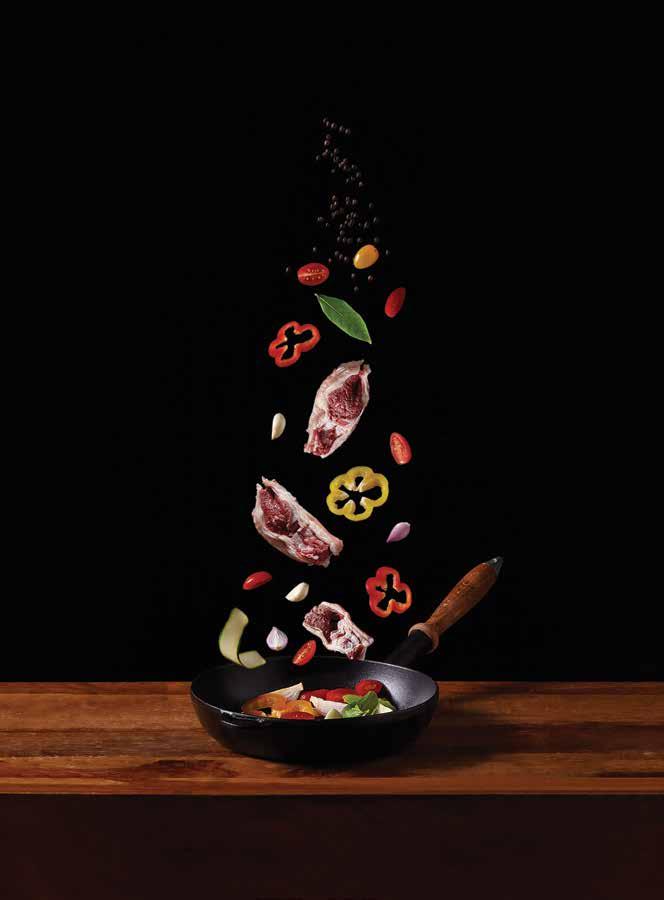
George Nasraoui is a man of many talents. Not only was he able to establish his firm during the Lebanese civil war, but he also managed to expand it on an international scale. Here, the founder and CEO of food manufacturing company Sonaco Al-Rabih and VP of the Association of

Lebanese Industrialists takes us on a trip down memory lane and discusses what the future holds for his company. How did it all start?
The Lebanese civil war first broke out in 1975, which is when the Sonaco narrative really began. I had a different specialty back then, and the conflict rendered Downtown Beirut inaccessible; it was where my office was located. As
a newlywed, I had to choose between staying in Lebanon or leaving, so I chose to stay. I soon realized there were no longer any tahini or halawa companies in my neighborhood, as they were all destroyed during the war. It was then that a friend of mine, a supermarket owner, asked me to source the products from Cyprus. Instead, I decided to open a tahini and halawa factory in my community to meet the local demand, which I inaugurated in 1976. This also marked the beginning of our production.
What is the story behind Sonaco and Al Rabih?

Sonaco stands for Societe Nasraoui and company. As for Al Rabih, choosing a name that was both Lebanese and Middle Eastern was challenging. Although we came up with various options, Al Rabih was the name people identified with the most; it sounded nice and reminded us of spring.
What can you tell us about Al Rabih’s slogan “your favorite Lebanese taste all over the world” and how you’re honoring this pledge?
When I first launched Sonaco, I was aware of how small the Lebanese market was, which is why all along the goal was to export our goods abroad. I wanted my products to reach Lebanese and Middle Eastern diaspora all over the world.
We started exporting to the GCC in 1978 after optimizing our factory and production capacity. During this time, my goal was to industrialize and modernize production. I began traveling throughout Europe in search of innovative ways to process sesame, from which we make tahini. Thanks to seven to 10 years of cooperation with a factory in Spain, I became the first Lebanese producer to transition from mechanical to automated production.
What are the latest food innovations and trends shaping the industry and how are you leveraging them?
For an ambitious person like myself, it was necessary to expand beyond Lebanon. Through my exports, I began to understand the needs and desires
of Lebanese and Middle Eastern consumers, which led me to broaden my product line and develop them. I became specialized in pan-Arab food production, with around 120 products. Some of our main products include tahini, halawa, hummus, oils, jams, olives, pickles, rose water, orange blossom water, pomegranate molasses and Mediterranean canned food.
Every year, we expand our product offering. Our latest edition, which we also export, is the canned pre-cooked meals with a two-year shelf life, such as stuffed grape leaves, stuffed zucchini and Lebanese green beans with extra virgin olive oil (loubié bi zeit).
Keeping up with modern times, people no longer have the time to cook at home; they buy pre-cooked meals, which is why I am optimizing this product segment.
Furthermore, I am expanding beyond the GCC and taking part in food trade expos. Back in 1978, SONACO S.A.R.L – AL RABIH was the first Lebanese company to participate in SIAL Paris. Since then, we have been taking part in international food shows every year, such as Anuga Germany, SIAL Paris and Fancy Food Show USA, which has helped us grow our client base and network globally. For 11 years, I was the deputy chairman of the Association of Lebanese Industrialists as well as the Dean of Lebanese Food Industries and worked on having a Lebanese pavilion at each international food trade show, such as HORECA, Gulfood and so forth. We began with a few industrialists and
developed into a sizable Lebanese pavilion under the Lebanese flag. Fellow industrialists reaped the benefits from such exposure, and we were all able to put Lebanese products on the international culinary map. On this note, I would like to thank them for their faith and support.
Thanks to seven to 10 years of cooperation with a factory in Spain, I became the first Lebanese producer to transition from mechanical to automated production.
How does it feel to work with your three sons?
I remain ambitious and work toward excellence. Each of my sons oversees a department that matches his expertise. They are really helpful, and I rely on them to improve and modernize our manufacturing. The factory now has an in-house lab that helps us comply with each country’s export requirements. We also have a labeling department that produces labels according to each country’s guidelines.
I first started the business as a one-man show, but it has developed and evolved with the industry.
Under your guidance, how do you see the future of the company developing?
Several Arab investors wanted me to open factories abroad, but I was always adamant about focusing on Lebanon and being the culinary ambassador of Lebanese cuisine.
Sadly, with all the ordeals we have suffered and the government’s neglect of the sector, my sons would like us to expand outside Lebanon. We are weighing up our options to decide where to open a new factory abroad.
facebook.com/AlRabihlb

How can Valrhona products help chefs be more creative?
Valrhona helps chefs think out of the box. In life, the more you get to work with different people, the more you learn. Beyond pastry, the world is full of beautiful things waiting to be discovered, pushing you creatively and inspiring you in different ways. Life, after all, offers a beautiful kind of magic that stimulates our senses.
Brice Konan-Ferrand , pastry chef of Valrhona, has chocolate running through his veins. We spent five minutes in the kitchen getting to know him.
In your opinion, which pastry trend is the one to follow in 2023?
I would say “reasonable gastronomy” is the trend to watch. Nowadays, people tend to overconsume, that is why chefs need to educate consumers and present them with a dessert that not only complements the meal but also takes their health into
Forging new career paths for underprivileged youngsters, Mohamad Hachwi, CEO of BanoPuratos Group, tells us how the family partnered with Puratos Bakery School Foundation to open Issam Hachwi Bakery School.

How did the project to open Issam Hachwi Bakery School come about?
It all began when my father passed away, last May. We wanted a project that would keep his memory and legacy alive, and that is how we decided to establish the Issam Hachwi Bakery School. BanoPuratos has already established this CSR support system, the Bakery School Foundation, to help local communities in each country. In recent years, the Bakery School Foundation opened
consideration. Fédéric Bau, Valrhona’s experimental pastry chef, showcased this new way of thinking about pastry in his latest book, titled “Reasoned Gourmandise”, which explores the fundamentals of healthy and harmonious pastry, while respecting the flavors and textures of the great classics.
After spending a month or so in the region, how would you describe the chocolate scene in the Middle East?
I have noticed that people in the Middle East love confectionery. There is a genuine passion for pastry and chocolate, and I really admire that about the region’s culture. Sweets are a staple of the MENA region’s culinary scene, and you can always find them in people’s homes.
valrhona.com
several schools in countries including India, Brazil, Mexico, South Africa, Romania, USA and the Philippines.
How will the NGO Bakery School Foundation help Lebanese youngsters carve out new culinary paths?
A total of 25 students were chosen to start with, and at the end of the two-year program, each student will be awarded a degree certified by the Lebanese Ministry of Vocational and Technical Education. They will then be able to become part of the region’s baking industry.
What are your ambitions for the Issam Hachwi Bakery School?
Through this establishment, we aim to raise the standards in the field of baking. We want our graduates to shine in everything they do. banopuratos.com


Contact
Bahrain: Fine Foods
Egypt: AM Foods
Jordan: Frozen Food House Co.
Kaylani Food Center
Kuwait:
Alyasra Foods
Azzad Trading Group
United Supply Food Services
Oman:
Chef Middle East Oman
Qatar:
Chef Middle East Qatar
Deliopolis
Qatar National Import & Export Co
Saudi Arabia:
Arabian Food Corporation
Gulfwest Company
UAE:
Aramtec
Chef Middle East Abu Dhabi

Chef Middle East Dubai
Faisal Al Nusif Trading Company
Rastelli Global Middle East
Transmed Overseas Incorporated

Whisky Live Beirut’s fifth edition took place from December 1-3, 2022. Welcoming over 5,000 visitors to Beirut’s Seaside Pavilion, the show was a big hit with whisky enthusiasts and amateurs, who enjoyed an array of masterclasses with international experts and brand ambassadors.
6-8 Mar. KUWAIT
HORECA KUWAIT
Leaders Group
Hospitality Services
Horecakuwaitexpo.com
7-9 Mar. GERMANY
ITB BERLIN
Messe Berlin GmbH itb-berlin.de
10-14 Mar. GERMANY INTERNORGA
Hamburg Messe + Congress Internorga.com
15-16 Mar. DUBAI
HOSPITALITY INNOVATION SUMMIT GGB Venture hospitalityinnovationsummit.com
19-21 Mar. GERMANY PROWEIN Messe Dusseldorf Prowein.com

APRIL 2023
6-7 Apr. DUBAI
DUBAI INTERNATIONAL TASTE AWARDS
The event opened in style on December 1 in the presence of the Lebanese Minister of Tourism, H.E. Walid Nassar, presidents of associations and syndicates, trade representatives, international experts and the media.

Guests were invited to sample the finest whiskies from more than 60 of the top international brands. Lebanese artisanal whisky and gin producers also launched their specialty brands at the show.

Organized by Hospitality Services, Whisky Live Beirut featured a whisky-tasting area, a Star Bar, masterclasses and Dine for a Cause whisky-pairing dinners.
“Whisky Live Beirut never fails to bring magic and sparkle to our capital, and we are delighted to have been able to organize this special event despite the numerous challenges. The success of our fifth edition at the end of what has been another difficult year for our country is proof that the Lebanese spirit continues to move and will always prevail, no matter what,” said Joumana Dammous-Salamé, managing director of Hospitality Services.
"We are looking forward to the sixth edition of Whisky Live Beirut, which will be held from October 26-28, 2023, at Seaside Pavilion. It is a key event for amateurs and professionals to enhance their knowledge in tasting and production. At the forthcoming edition, we will be inviting new international brands to showcase their products, as well as fresh faces and experts to share their know-how and discuss the latest trends," said Maha El-Khoury, project director.
She added that there will be a greater focus on Lebanese artisanal whisky and gin. "With more than 10 distilleries, Lebanon is also declaring itself as a new land for gin and whisky."
whiskylivebeirut.com
DITA dubaitasteawards.com
25-28 Apr. LEBANON
HORECA LEBANON Hospitality Services Horecashow.com
25-28 Apr. SINGAPORE
FHA FOOD & BEVERAGE Informa Markets fhafnb.com
MAY 2023
1-4 May DUBAI
ARABIAN TRAVEL MARKET Reed exhibitions
Arabiantravelmarket.com
7-9 May KSA – RIYADH
FUTURE HOSPITALITY INVESTMENT SUMMIT
Bench Events futurehospitalitysummit.com
18-20 May. DUBAI
SALON DU CHOCOLAT DUBAI
Hospitality Services
Salonduchocolatdubai.com
20-23 May USA
NATIONAL RESTAURANT ASSOCIATION SHOW
Winsight nationalrestaurantshow.com
23-25 May DUBAI
THE HOTEL SHOW
Dmg: Events Middle East & asia & DWTC thehotelshow.com
29-31 May ABU DHABI
EXPO CULINAIRE
The Emirates Culinary Guild emiratesculinaryguild.net
30 May-1 Jun. OMAN
HORECA OMAN
Al Nimr Expo & Hospitality Services Horecaoman.com



The 28th edition of Gulfood is set to be 30 percent larger than previous years and is set to bring sustainability to the fore. Taking place At Dubai World Trade Centre from February 20-24, 2023, the event will bring together F&B communities to chart the way forward.

With the UAE preparing to host COP 28 in 2023, Gulfood will serve as a meeting place for the global F&B industry at the start of the year and continue the shift toward more sustainable food production and consumption, unveiling new products and innovations, as well as creating an international platform for business opportunities.
The 2023 Gulfood edition will unveil two new global sustainability
initiatives: Gulfood Green and Gulfood Global Forest. For the first time, it will also spotlight global chefs who are spearheading biodiversity in the restaurant industry, with masterclasses and workshops.
The Gulfood Green Awards will also take place this year, with submissions open to the industry in five categories: the Green Foodservice Industry Award, Waste Management Award, Green Food Innovation Award, Sustainability Professional of the Year and Sustainability Company of the Year.
Elsewhere, Gulfood Inspire conference will champion sustainability, quality and access. gulfood.com
Towards Net Zero. The event aims to offer industry leaders and policymakers from across the Middle East and beyond the chance to discuss challenges and explore opportunities related to the future of sustainable travel.
The conference program will address sustainability issues in travel and tourism, with commentary from leading industry figures. Several sessions will be dedicated to key source markets, including India and Saudi Arabia.
The Arabian Travel Market (ATM), which is set to take place at Dubai World Trade Centre from, May 1-4, 2023, will celebrate its 30th anniversary by unveiling its sustainability pledge — Working
ATM will see the return of the ATM Startup competition, in which seven innovative travel startups will showcase solutions impacting travel sustainability and recovery. Having officially kicked off its journey to net zero, the conference program will explore how innovative sustainable travel trends are likely to evolve, allowing delegates to identify growth strategies
within key vertical sectors while providing a platform for regional experts to explore a sustainable future ahead of COP 28, which will take place in November 2023 at Expo City Dubai.
The Best Stand Awards will also feature a sustainability category for the first time. Exhibiting organizations will be recognized based on the extent to which they have considered the environmental impact of their stands, as well as their efforts to reduce their carbon footprint.

ATM 2023 forms an integral part of Arabian Travel Week, a 10-day festival of travel and tourism events.
wtm.com/atm


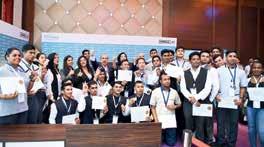
Returning to Kuwait International Fair from March 6-8, 2023, HORECA Kuwait will be bringing together the top names in hospitality and foodservice, not to mention the hottest and most innovative products. We discover what’s planned at the renowned trade show with Mohamad Najia, executive director of Leader’s Group for Consulting and Development, HORECA Kuwait organizer.
How would you describe HORECA Kuwait?
HORECA Kuwait is a meeting place for foodservice and hospitality professionals. The event attracts many of the top companies in Kuwait and allows visitors to network and do business.

What's planned for the 11th edition?
First of all, the exhibition space is much larger than the previous edition, as we are returning to Kuwait International Fair. Also, the show is set to host exhibitors from Lebanon, KSA, Russia, the UAE, US, South Africa and China. All in all, it looks set to be a fantastic edition.
Why should industry professionals visit the event?
Now that the pandemic is behind us, there is a real need to meet in person and reconnect face to face; online events are not the same, and they will never be able to replace actual trade shows. Professionals who join us at HORECA Kuwait will be able to meet suppliers, discover new products and services, and watch live competitions.
How does this event support the hospitality and foodservice industries in Kuwait?

Being the premier business meeting place for the hospitality and foodservice industries in Kuwait, HORECA Kuwait allows suppliers, distributors and buyers to network. This, in turn, creates new opportunities and helps to drive these industries forward. Furthermore, the event supports the new generation and rising stars in hospitality and the culinary arts through a number of live competitions that reward talent and creativity. These contests include the Hospitality Salon Culinaire, the Barista Competition and Bed Making Competition.
What are the key hospitality trends in Kuwait and what are your expectations for 2023?

Kuwait’s hospitality scene is not what it was years ago. Today, a huge variety of restaurants and hotels can be found in the country, catering to all tastes and audiences. Demand is creating new opportunities for restaurateurs and hotel operators, I expect to see many more concepts making their way to Kuwait, especially coffee shops and fusion restaurants. It’s an exciting time for the region as a whole.
horecakuwaitexpo.com


Established almost 30 years ago, HORECA Lebanon is set to mark its 27th edition from April 25-28, 2023. Despite a two-year hiatus, the trade show is now expected to welcome thousands of professionals once again.
More than 150 exhibitors will be present to showcase their products, services and technologies to 12,000 trade visitors, who will be heading to Beirut from across the region to network and forge valuable business partnerships.

“We are thrilled to be back at Seaside Pavilion with a strong message for the industry — ‘Connect. Inspire. Explore.’ We want those who attend HORECA Lebanon to inspire and be inspired, as the future of the hospitality world is ours to shape," says Joumana Dammous-Salame, managing director of Hospitality Services, the event organizer.
Besides the exhibition area — dedicated to food, drink, catering equipment, tableware and hygiene solutions, as well as packaging, labeling and other hospitality-related products and services — HORECA Lebanon will feature several events. These include the HORECA Theater, where leading brands will host product demonstrations; Salon Culinaire, featuring cooking workshops and competitions; the Lebanese Bartenders Competition, which will include masterclasses with the experts; and Lebanese Barista Competition.
Elsewhere, HORECA Talks returns to the scene for another series of roundtable discussions with industry leaders, which will dive deep into hot topics such as accommodation trends, technology, business opportunities and challenges in 2023. horecashow.com


As Lebanon’s largest hospitality and foodservice exhibition, HORECA Lebanon is set to return to Beirut’s Seaside Arena in just a few months’ time. Here’s what to expect.
Digital technology, sustainability and experience-led events are just some of the emerging trends that are set to transform the future of the event industry. We asked two industry experts and event organizers to lift the lid on where the industry is heading.
With the recent developments in AI, AR and VR, event organizers can create otherworldly, individualized experiences for visitors. The possibilities are endless thanks to the accessibility and affordability of AR technology.
frequent breaks to keep guests energized throughout the day. In order to engage with attendees, there will be a strong emphasis on keeping things light and relaxed. Expect quality workshops, not jam-packed programs.

While online events will continue to garner attention, many organizations will prefer to host or attend in-person events. The virtual world will never be able to replicate the experience of a live trade fair. Indeed, 78 percent of marketers surveyed by LinkedIn said they want in-person events to regain prominence, especially if they incorporate some virtual components.
The virtual world will never be able to replicate the experience of a live trade fair.

As flight costs rise and the cost-ofliving crisis intensifies, hybrid events are crucial to the future of the events sector, allowing it to deliver content to audiences around the world.
Events won't be as frenetic they once were; instead, the focus will be on
Sustainable initiatives should be implemented at events to show that organizers care about reducing their impact on the environment. This might involve a recycling system, reducing the use of single-use plastic and disseminating digital information, rather than printing catalogs, brochures and other material.
Through tracking social media activity before, during and after an event, organizers will be able to better tailor their events and offer the best possible customer experience. This is also made possible by automatic feedback emails. Unconventional event venues Selecting a visually appealing location will ultimately get people talking and is likely to encourage the sharing of posts and stories on social media.
Probably the most prominent trend in our sector in recent years, accelerated by the global pandemic, is the adoption and incorporation of digital technology at events of all shapes and sizes. From on-site digital features, hybrid attendance options and networking apps to stage livestreams and more engaging social media content, digital has truly transformed the way we run our conferences and summits. On-stage screens, videos and AV choreography have considerably increased the expectations of consumer. And with the rapid advancement of technologies like AI and holograms, I expect technology to play an even bigger role in the future.
There is a greater focus on sustainability in the event sector; it was at the heart of last year’s Future Hospitality Summit in Dubai not just in terms of the panel discussions but also with the experiences for delegates, which included visits to the world’s largest vertical farm, Bustanica, Dubai Turtle Rehabilitation Project and
Fish Farm, which supports the local aquaculture industry. We also hosted the finals of the 2022 Sustainable Hospitality Challenge, where student teams from leading hotel schools presented their ideas on sustainable hospitality. It was fantastic to see an exceptional level of innovation in their projects.
Sustainability practices are also becoming a determining factor for event organizers when choosing host partners and venues. Personally, I’m hoping that options such as the use of glass bottles instead of plastic, water stations with purified water, locally sourced produce for the food and beverage offering and recyclable badges and lanyards will become standard in the future.
I believe that there is a place for quality hybrid events, combining the ease, efficacy and scalability of online sessions with the rising need for face-to-face events.


Another important development is experience-led events that go above and beyond great business content, discussions and networking opportunities. There’s a need for all-round educational, balanced and enjoyable experiences at events. As an example, our most recent event in Dubai featured group sports sessions, a tennis and golf tournament, as well as off-site educational outings,
including a visit to the Museum of the Future. This combination of personal and professional experiences that can be shared with industry peers allows attendees to make meaningful new connections and deepen existing relationships.
During the pandemic, event organizers had to pivot from traditional in-person events to online events and virtual conferences on a local and international scale. Online events were valuable in allowing us to stay connected to our communities and understand attendee sentiment during the crisis. Looking ahead, I believe that there is a place for quality hybrid events, combining the ease, efficacy and scalability of online sessions with the rising need for face-to-face events, where attendees have the opportunity to rub shoulders with industry peers.
While the metaverse hasn’t yet emerged in its full form, I predict that it will redefine how events are produced and how attendees engage with each other, fusing real-life activities into the virtual world through technology. Future opportunities will include virtual reality, augmented reality and mixed reality experiences to enrich attendee engagement. With 3D avatars a fundamental aspect to entering the metaverse, attendees will be able to move around, talk to each other, attend breakout sessions and network. The scope of creativity is unlimited, and this presents immense opportunities for organizers to completely transform their event experience. This will be a very interesting addition to in-person events, so watch this space.
Built around cognitive cities, NEOM is unlike anything the world has ever seen. We find out what’s planned, with Peter Fitzhardinge, NEOM’s acting head of tourism.

Many people may not know that a great deal of thought went into naming NEOM. The first three letters derive from the ancient Greek prefix neo, meaning “new,” while the letter M is a nod to the Arabic word for “future.” How is this attention to detail reflected in the overall project?
There is nothing random when it comes to NEOM. It is a very wellthought-through vision and project. It’s strategically based, coming at a time when the world is in need of new ideas and concepts.
NEOM is a “living lab,” challenging us to go beyond what we know. We are actively encouraged to push the boundaries but always with purpose and with a goal in mind. This strategically robust diligence and collaboration breeds confidence to deliver worldchanging ideas, and that is what lies at the heart of NEOM. I see NEOM as a gift to the world, and having a role in this “new future” is very rewarding indeed.
NEOM positions itself as a region that will be home to hyperconnected, cognitive cities. What are the major differences between a smart city and a cognitive one?
NEOM will be home to THE LINE, a cognitive linear city; Oxagon, an advanced manufacturing hub and port; Trojena, a year-round mountain tourism destination; and Sindalah, our newly announced luxury island destination.
THE LINE will be a cognitive city within NEOM. Whereas a smart city typically uses around 5 percent of the data it gathers to control, manage and optimize infrastructure, and does so reactively,
THE LINE, by contrast, will use and analyse around 90 percent of data and will be predictive as opposed to reactive.
Cognitive cities are able to adapt to accommodate citizens as a result of their intelligent, connected systems. NEOM’s cognitive urban environments, including THE LINE, will learn and grow by interacting with their citizens through information and communication technologies, adapting their behavior based on past experiences.
Explorers are looking to discover new destinations, and NEOM is perfectively positioned to ignite the adventure seeker in us.
How significant is tourism in the vision of NEOM?

Tourism plays a major role in NEOM, as it does in Saudi Arabia as a whole. Besides being a top contributor to NEOM’s GDP, the hospitality aspect of the project will provide plenty of jobs and great opportunities for Saudis and industry professionals around the world.
NEOM is a spectacular and diverse land. It is truly the best of all worlds: untouched coastlines, snow-capped mountains, vast red deserts and a heritage story waiting to be told. In addition, 95 percent of NEOM’s 26,500 square kilometers will be protected as a nature reserve.
Explorers are looking to discover new destinations, and NEOM is perfectively positioned to ignite the adventure seeker in us. This is coming at a time when world travelers are emerging from Covid-19 and seeking more authentic, lesser-known lands farther afield. They want to be the first, and we will have the experiences to match.
Being at the helm of such a groundbreaking project, what are the major obstacles you face and how are you able to overcome them?
NEOM is a blank canvas. This means we have little holding us back. We don’t have to reconfigure an existing city footprint; we can just start from scratch.
As with all of our projects, our unwavering commitment to the environment and nature sometimes means that we must think differently. At NEOM, we are often already doing what others are not even thinking about yet. My nature and environment colleagues are front and center in every conversation. We see this commitment to nature as an incentive to push harder and find new ways to help the world and design a better future where humans can find a more sustainable balance. It’s why we are all here.
Can you share any new developments about NEOM?
We are delighted to add Sindalah to NEOM’s tourism offering. Our luxury island development, at the heart of the Red Sea, is expected to start welcoming guests from early 2024.
NEOM is a constantly evolving project. I am sure that 2023 will be full of more exciting news, so stay tuned.

The pandemic taught us that nothing should be taken for granted. And, with most countries having now lifted all Covid-19-related restrictions, the vast majority of people are keen to once again make travel an important part of their lives, albeit in a year of no-normal, as Nada Alameddine, managing partner at Hodema consulting services, explains.

In October 2022, the digital travel platform Booking.com asked more than 24,000 people from 32 countries how they foresaw their travel plans in the months to follow, with war, instability and inflation dominating world news. The report stated that: “2023 will be about creatively reimagining travel amid the chaos. Nothing will be off limits and everything is on the menu as everyone seeks to find the right balance in a world of contradictions.” Expedia also announced: "In 2023, travelers are ditching the conventional and veering off course for all-new experiences. Prepare for the year of the no-normal.”

So, what does this all mean for the future of international travel? The key word will be “adaptability.” Travelers will need to adapt to potential new health restrictions; they will have to navigate rising transportation and hospitality costs, as energy bills will likely increase, unlike salaries. They will be required to adjust to new geopolitical considerations, as previously safe countries become no-go areas; and they will also be encouraged to adopt more climate-friendly traveling habits. The question remains, how do we reconcile our urge to travel with times of great change?
For some, the answer is venturing off grid. A way to forget about the world and escape the everyday is to focus on nature and go off the beaten track. Sleeping in tents or cabins, cooking on campfires and trekking in the woods are great options for people looking for a back-to-basics experience. Nature lovers and green activists will also find holiday plans that match their values. For more radical individuals, learning survival skills is crucial, such as lighting a fire or foraging in the wild. But for those who are not ready for such extreme plans, switching off from our connected lives by traveling to a place with no screens or internet and making our own meals can be a good way to start the “off-grid” experience.
After almost two years spent in our living rooms, many of us were yearning to travel far away and discover new cultures and places. Indeed, 73 percent of travelers surveyed by Booking.com expressed their wish to escape their zone of comfort. For most, this means visiting remote places, discovering hidden gems and learning about exotic traditions and languages, while for others, the plans might be more peculiar, such as tasting the hottest chili pepper, going on alien spotting tours or simply buying a one-way ticket somewhere.
After almost two years spent in our living rooms, many of us were yearning to travel far away and discover new cultures and places, escaping from our comfort zones.
The good old days
A common way of dealing with uncertainty is to reminisce about the past, a soothing exercise to forget about how unclear and ambiguous things are. The same applies to travel; we all remember places we love from our childhood or early adulthood. People strive to find comfort and nostalgia in their past trips. Also known as the “madeleine moment” or Proust effect, these places can be a family home or a popular summer or winter destination.
Television also has a big impact on our travel choices. According to the latest Expedia survey, some people are turning to popular TV series and films for inspiration.
Me time
Another way to find comfort and reduce stress is by going on trips that focus on wellness, such as retreats or pilgrimages. These health hiatuses can be religious, sport-related or meditative.
The “bleisure” trend Business travel is back. However, the forced break caused many employees to reevaluate their employment conditions and seek less
stressful, more relaxing environments in which to work. This also applies to work trips. Companies are looking to build more camaraderie among staff and offer a leisure side to work trips. So themed stays are on trend, with games and teambuilding activities on the menu. The ability to work from anywhere is also creating new destination options for firms.
Another world is opening to tech-savvy travelers, with virtual reality, biometrics and the metaverse now providing new travel experiences. Consider the metaverse a new kind of travel agent, which makes us try places; we may never even visit. The rapid evolution of the technology will soon enable users to feel 3D touch and sand or heat with their hands. Biometric payments via ApplePay or GooglePay will also become more mainstream. The digital transformation will be applied to border management as well: electronic Visa authorization systems, cloud-based passports and digital identities are all in the works to speed up border crossing, although privacy remains a big concern.
Whether you go for a low-cost holiday or a lavish one, identifying your budget is the first step to your next holiday. Travelers are now more conscious about the price of their trips after years of traveling economically around the world. Boarding a plane had become less expensive than taking the train and sometimes even driving a car. But now the price of fuel, and its impact on the environment, is making consumers think twice before booking a ticket. So, budgetconscious tourists will be looking even more closely for deals, loyalty programs and discounts. Some options to save money can be to travel off season, pick longer journeys or book in advance. Wealthier travelers are not giving up on their luxurious trips, though. According to Booking.com, some people are ready to spend more on their next holiday to make up for lost time. Another reason is that many hotels and airlines are struggling with staffing problems and are thus reducing their services to customers. To benefit from a comfortable experience, guests now need to pay the extra dollar.
hodema.net

With its unique culture, landscapes and culinary riches, Morocco is among the world’s most enchanting countries. Hala Matar Choufany , president for the Middle East, Africa and South Asia at HVS, describes the hospitality scene in the North African jewel and what makes it such an intriguing tourism destination.

Together with Egypt and South Africa, Morocco is one of the most visited countries in Africa, benefitting from its proximity to Europe, political and economic stability, and robust infrastructure. As an African, Arab and francophone country, the vast majority of Morocco's citizens are fluent in Arabic and French, with a large percentage also able to communicate in English - a plus when it comes to interacting with Western tourists.
The tourism industry, a prime source of foreign currency in the country, contributed 18.9 percent to the country's GDP in 2019 and is now bouncing back, with a recovery rate of nearly 80 percent. According to the Department of Studies and Financial Forecasts (DEPF), Morocco’s tourism revenues reached MAD 71.1 billion (USD 6.8 billion) at the end of October 2022, an increase of approximately 120 percent when compared to 2019 levels.
Additionally, the country recorded 7.7 million tourist arrivals and 13.3 million overnight stays in registered accommodation facilities during the
first nine months of 2022. The numbers represent a 76 percent and 69 percent increase respectively, compared to prepandemic levels.
FIFA World Cup success
Morocco’s stellar performance at the FIFA World Cup in Qatar was celebrated by football fans and supporters globally. The team’s remarkable run, which saw them reach the semi-finals of the global sporting event, served as a massive marketing campaign, with millions of people sharing posts and stories on social media platforms.
According to the Minister of Tourism Handicrafts and Social and Solidarity Economy (MOT), Morocco now appeals to far more countries than the traditional source markets, which will undoubtedly have a positive impact on the future of
tourism there. Such awareness and rising interest in visiting the country will allow the government and MOT to accelerate many of the planned investments and promotional campaigns that were launched during Covid-19 and continued throughout 2022 to support growth in the sector. In fact, the government allocated MAD 616 million (USD 67 million) to revive its tourism sector in 2022, and data suggests that there was a 15 percent increase in the number of investments in the sector in 2022 when compared to 2019.
There have also been some notable hotel openings and new project announcements in the last 12 months, as well as a number of government and private collaborations that will naturally support the development of tourism initiatives.
Société Marocaine d'Ingénierie Touristique (SMIT), the body in charge of promoting and facilitating tourism investments in Morocco, has also been active in supporting strategic public-private partnerships, further accelerating the pace of investments and the development cycle. A number of partnerships were signed in 2022, such SMIT & V Holding Saudi Arabia — with plans to develop a portfolio of 12 hotels by 2025 — and SMIT & TIME, set to manage 35 lodges at an eco-resort in the Atlas Mountains.
Additionally, 737 establishments have benefited from grants (estimated at around MAD 1 billion) to upgrade, renovate and expand, thus meeting potential demand increases.
The future development and outlook for tourism in Morocco is positive, and investment opportunities appear promising and attractive. The MOT is focusing on the growth of “local experiences,” supporting home-grown brands through the promotion of cultural, natural and ecological tourism, and facilitating investments through strategic partnerships. Indeed, Morocco has ancient artisan and handcraft industries that date back
hundreds of years, and tourists often enjoy visiting the traditional bazars to meet the craftspeople and buy traditional products made by hand.
The Ministry of Tourism is focusing on the growth of 'local experiences,' supporting home-grown brands and facilitating investments through strategic partnerships.
The tourism sector also intends to capitalize further on domestic tourism, which proved to be a strong demand contributor during the pandemic. Transportation infrastructure supports local travel, and the MOT set local tourism as a priority in its growth strategy. Traditionally, Casablanca, Marrakech and Rabat have been the more developed and visited cities in Morocco, yet the MoT’s current strategy is a holistic one that aims to improve the attractiveness of the country as a whole, especially its three southern regions: on the unspoilt coastal line and the vast inland desert regions characterized by unique cultural heritage. This strategy is supported through SMIT, which provides
financial and technical assistance to local authorities in underdeveloped territories to improve their tourism appeal. Interestingly, MAD 1.5 billion (USD 144 million) has been pledged to new programs that are focused on improving outdoor tourism experiences in such areas, including the development of glamping facilities and other desert experiences.
A positive outlook
Morocco is a fine example of a country where tourism is benefiting the economy and enhancing its attractiveness to investors. Tourism's contribution to the economy, which is forecast to reach 20 percent of GDP once the market has fully recovered, could also sustain up to 1.8 million jobs, or roughly 15 percent of total employment.

SMIT’s tourism 2023 action plan focuses on “consolidation and diversification of the tourist product, technical and financial support of developing regions,” along with the inclusion of SMEs in tourism programs. This will be further supported by launching e-visas, which will open more doors to new markets.
Given the country’s culture, history and affordability, the outlook for Morocco is bright. Collaboration between the private and public sector, as well as local and international partnerships, will undoubtedly play a significant role in further improving the North African country’s overall hospitality offering.
hvs.com
We asked a group of successful restaurateurs to share their insights, philosophies and upcoming projects with Hospitality News Middle East. Here’s what they had to say.
market and appeal to new customers. We are utilizing technology, such as online ordering, digital menus and contactless payment options, to improve the customer experience and keep up with current trends in the industry. In addition, we are incorporating sustainable practices, such as using locally sourced ingredients, reducing food waste and using eco-friendly packaging to better serve customers who are environmentally aware. Recently, we have added healthier dishes to our menus, as well as a variety that cater to specific dietary needs.
CHAWKI E. BARAKAT Managing director Barakat Foods Company bfc.com.kw
We are about to celebrate 70 years of service to our clients — a milestone attributed to the strong core values that we have remained committed to over the decades. It starts with our team, referred to as the “junior partners” in our journey. We hire the best to fit our hospitality culture. We continuously seek to procure the highest quality ingredients for our
menu dishes. Our pricing strategy aims to appeal to all nationalities. Throughout the years, we have prided ourselves on delivering consistency in our food and customer service.
Keeping up with the latest trends is essential for our restaurants to stay relevant. We regularly update our menus to include new dishes or ingredients that reflect current food trends. Furthermore, we frequently rebrand or reimagine our concepts to stand out in a crowded
It's important to note that these are just a few examples of how our restaurants are redefining themselves to stay relevant. Trends change over time, so we need to stay informed about the latest developments and adjust our strategies accordingly.

We developed a franchise package for Mais To Go brand. We are now ready to expand in the GCC, so we are seeking potential franchisees for the concept.
Motto
Genuine hospitality through generations.
The formula for success is simple. We use the best products and work with great cooks; this is how we earned our reputation in the industry, and we are keen to keep it that way.
Our concepts fit the markets we are operating in. We move strategically and smart, so our expansion is always timed. Having popular and successful

restaurants is the objective, not just to open whenever and wherever we have the opportunity. Furthermore, we keep everything under our full management, and our dedicated team has been active in the opening and launching of each brand; they know what it takes to secure a great experience for our guests.
Teamwork
New cooking techniques are constantly emerging, as well as new trends and products, so we have to stay at the forefront and understand the requirements of the market while
The success behind our restaurants is based on a genuine concern about our customers’ needs. We do not compromise on quality, whether it’s our thoughtful and creative interiors, outstanding resources or superior ingredients.
We try to keep up to date with global trends. The new generation has an entire set of new requirements. We also continue to modernize our systems, as staying abreast of the latest technology and know-how is essential.

We’re currently working on enhancing and expanding some of our outlets, as well as researching possible markets in parts of the Gulf states. Further expansion is underway at one of our sister companies in Berlin, Germany.
Mantra
The best way to find yourself is to lose yourself in the service of others.
remaining true to our philosophy. Maintaining your identity without becoming outdated and forgotten is a delicate balance.
As a team, we continuously attend international food exhibitions to discover the newest products and ingredients. We travel to Japan, Italy and other destinations, and, over the years, we have met outstanding chefs and suppliers who have become partners. Many of them have visited us in Beirut to support our efforts and ensure that the food that we are serving is as good and authentic as it can be. I can confidently say they were impressed with what we built.
Openings
In 2022, we opened Ni Caffe’s second branch in Cairo and third in Al Sahel, Egypt. In Q4, we also opened Ni Caffe in Baghdad, Iraq.
Summer 2023 will be very exciting for us. We have new projects scheduled, including a rooftop venue in Beirut and another Ni Caffe in Batroun.

Mantra
I believe working hard always pays off. Stay hungry and never get too comfortable.
ESSAM FAKHRIDDIN CEO ATICO Fakhreldin Group atico-jo.com/#homeThe success of 7 Management is not down to one factor, but rather a mix of things. Firstly, our creativity and innovative ideas put us ahead in quite a competitive market, making our brands stand out. The execution of these creative ideas is done by our superb team. The 7 Management team is composed of people who strongly believe in its vision and who are passionate about customer connection. The team has to work in an environment it is happy with, and all its members must be heard and valued. We invest in our people and treat them well. Those in leadership positions must be humble.
Another factor is understanding competition. This means not simply monitoring what’s new but rather comprehending the approach of competitors in order to come up with ideas and brands that are truly unique. In addition, there is understanding customer needs and market requirements. Customers are at the heart of our everyday business, and they are at the top of all our priorities.
To us, it is not about keeping up with trends as much as it is about setting them. I am proud to say that 7 Management is a trendsetter. We give our brands unique stories. Each venue has its very own identity, meaning and values, creating a connection between the place and its guests. This relationship makes our concepts flourish.
Innovation and a vivid imagination are permanent tenants at 7 Management. In order to stay relevant or, in fact, ahead, you have to constantly deliver original concepts. This gives us immense confidence to not worry about competition or other venues copying us.
We do, however, incorporate trends from other industries to stay at the forefront.
Our brands will be popping up in multiple cities across the region. In Abu Dhabi, we will be introducing Antika and Café Beirut in 2023. Our vibrant Italian concept, Limonata, will find a new home at Dubai’s Vista Mare. Also, thrill seekers in Dubai should watch out for a brand new venue at Sayf, Dubai Festival City’s hottest addition.
Saudi Arabia, which is a young market rapidly emerging, will welcome a Lucia’s and a Seven Sisters in 2023, while Café Beirut will open in Doha, Qatar, and Antika will be taken to Manama, Bahrain.

Beyond the region, we intend to penetrate new markets. We are aiming to open Lucia’s in Greece, and to bring many of our brands to Athens. Opening Café Beirut in the UK and the US is also on the horizon. We want the Café Beirut brand to become a worldwide landmark.
Philosophy
True leaders create other leaders, not followers.
future trends and how well we can adapt menus once trends change. We ensure our venues and products are varied and that we’re able to cater to a wide range of palates; it’s this diversification that reinforces our continuous growth and success.
What’s coming up
First and foremost, location is very important — securing unique destinations that help to create an extraordinary guest experience. The right concept must fit the right location; a simple statement but vital to ensure success. Finally, and most importantly, success is achieved by having a great team.
Keeping up with the ever-changing trends and consumer demands is imperative for the overall success of the business. Landscapes progress and develop as interests and tastes evolve. At Sunset Hospitality Group, we are well versed in predicting this shift and understand the importance of anticipating trends. We travel, we visit other restaurants, and, most importantly, we never stop learning.
When launching a new venue, we undertake extensive market research into current and
Toward the end of 2022, we received significant funding from Goldman Sachs — the firm’s first investment in the hospitality sector within this region. The funds will be used to bolster our ambitious global expansion plan which is already in full swing. There are 20 additional venues that we’re looking to open by the end of 2023, the majority of which are overseas. We’re already present in 10 countries worldwide, and our market portfolio is continuing to grow, since we anticipate entering another four or five markets in the coming months.
We’ve currently working on brand expansions of existing venues in Europe and Asia, as well as launching new experiences in Dubai. A wonderful project we’ve been working on for some time is Signor Sassi. Our branch is set to open its doors in a matter of weeks.

Motto
Bring people together to celebrate life.

Passion for the industry
In order to succeed, you need to love what you do. Without that, you might make money, but that, to me, is not the same as success. Together with passion comes purpose. You need a strong “why” in order to inspire others, whether clients or employees or colleagues. Only when you have passion and purpose will you be able to deal with major losses and failures. These give you
the strength to learn from difficulties and stand up once again! My passion is food and, through food, sharing with others everything I love: nature, fragrances and flavors, seasons and stories, and a sense of belonging.

Inspiration
We live in an ever-changing world, and the F&B industry is susceptible to change. There are two root causes: one is related to a creative aspect, a taste for things that are new and different, and the other is reactive, a response to changes in the environment,
the outlook people have on life and the challenges we face. The latter cause for change is certainly one we, in Lebanon, are very good at: adapting to the challenges and reinventing ourselves in a constantly challenging environment.

When it comes to creativity, I like to travel and explore what is happening around the world. I am most inspired when I discover a new herb or an unusual combination of tastes, a mistake in the kitchen, a smell or a complicated request. I love to meet chefs who are passionate about the food they prepare. I learn a new technique and use it with our flavors; I discover a flavor, a different way of combining things and integrate it into our traditional recipes. For me, tradition stays alive through change and adaptation.
The team and I are always on the lookout for ways of improving the user’s experience. And we have successfully adapted the ancient Armenian cuisine to suit modern trends while preserving our rich heritage.

We just opened Batchig in Beirut City Centre and Mayrig in Cairo. We will definitely be expanding into other markets, especially in the GCC and Europe.
Mantra
Together, we can do it.
especially in a fast-paced city like Dubai. Our customers are at the heart of everything we do, and so we always have our ears to the ground on what’s working well and what could perhaps be done differently. By being connected to our audience, our communities and our key demographics, making any necessary tweaks is relatively straightforward, as it’s guided by them.
While it’s also important to be market aware and know what else is working well with our competitors within the city, it’s also important that we stay focused on our brand ethos. Trends come and go. Instead of following all of them, we stay true to ourselves and only prioritize the ones that align perfectly with what we’re trying to achieve.
Whether it’s the neighborhood hangout Reform Social and Grill or a slice of Paris at Bistro Des Arts, one of the biggest reasons for our success is that we know what we are. Each venue has a well-defined concept, with clear positioning and dedicated teams who align with that vision.
From the way we brand each outlet to the décor used in the fit-out, and, of course, the ever-evolving menu offerings, we focus on
authenticity and pride ourselves on serving our guests something that’s different. We pay particular attention to the quality of the ingredients we use, sourcing locally wherever we can and ensuring that the price represents value for money that we can then pass onto our customers.
And last, but by no means least, our handson management drives the brand DNAs, and I am lucky to be working with a fantastic team around me.
Customer-centric approach
I’m a firm believer that if you rest on your laurels, you automatically fall behind,
Part of our success has been my insistence on growing wisely and smartly. While it’s always tempting to change that, being diligent is something that I will always pride myself on. Projects are currently being reviewed and studied, and we have two projects that will come to life in Q1 2023 and the rest throughout the year, with an exciting entry into Abu Dhabi.
Philosophy
Live life deeply and take calculated risks to continue evolving and shining.
ALINE KAMAKIAN Founder and CEO Fig Holding alinekamakian.com // figholding.comWe've remained committed to keeping the same standards since we began in 1961, respecting the golden formula: quality, value and taste. Now, we are the third generation to manage our brands through establishing a structured company — Ramy Holding and TR Square. Our iconic concepts can be found throughout the Arab world.

As the management team of our own brands, we are not afraid to reinvent ourselves, and now we are seeing big rewards. This reflects our resilient mindset. We have recreated our menus, keeping our star items and secret recipes. We have also cooperated with international designers and architects to renovate our venues, making them cozier for our clients. We are always keen to maintain a close relationship with our audience through social media and our customer care channels.
Furthermore, we prioritize our employees, engaging with them and providing interesting training programs to refine their talents and ability to satisfy our customers. We constantly remind them that they are our partners in the production cycle and without them no institution can maintain its operations.
In 2022, we launched Al-Sultan Brahim at the Grand Sheraton in Doha, Qatar. We also opened Al-Falamanki in the city. We are looking forward to opening AlSultan Brahim, Al-Falamanki and Diwan Beirut in Riyadh, KSA.
While our Lebanese brands can be found in Kuwait, Qatar, KSA and UAE, we don’t open branches in haste, as we want to protect and maintain the quality of our concepts and the uniqueness of our brands.
We work hard because we love delicious food; every ingredient tells a story. From our fresh foods, we promise to produce fresh ideas to satisfy the taste buds of our loyal customers, who have become our extended family. We should always remind ourselves that perfection is not a destination but a journey.
and we are always looking for ways to adapt to the changing requirements of our customers while maintaining our brands’ values and directions.
We also regularly strive to introduce new ideas and concepts, be it food, design or experiences, that exceed expectations in a sophisticated market that is constantly evolving with ever-increasing expectations.
We do have an incubation platform that is routinely visited, edited and managed to shed more light on Gastronomica’s evolution and future. We are excited to announce that we have several new projects in the pipeline, including a further pivot into the Asian food realm.
We are humbled and proud to say that our restaurants have seen tremendous success. This is attributed to our approach of keeping things simple, clear and direct. Focusing on each individual concept and engaging the prospective markets as projected whilst creating several unique dining experiences is a key part of our strategy.
We believe that quality and innovation, in

all their forms, are key to providing a total quality experience for our customers, and we are constantly striving to improve and evolve our offerings. Furthermore, our focus on understanding the market, along with the needs and demands of our customers, has allowed us to stay ahead of the curve and continue to grow our respective brands.

As the food industry is always changing, we understand the importance of staying relevant and adapting to new trends. This is why we are constantly researching and developing new ideas to satisfy our respective markets and target audiences,
On a regional scale, we are witnessing systematic market expansions in the GCC in various concepts with new openings of our existing brands, while also entering new categories of the food service pyramid with exciting new concepts to cater to new segments.

We believe that food should be the focal point of the dining experience, and we strive to deliver exceptional quality in taste, space and design in a Total Dining Experience (TDE). We are committed to providing nothing but exceptional quality, and we believe that everyone deserves to have a truly memorable dining experience.

Franchising has long been recognized as a reliable pathway to growing a business locally and internationally, with hospitality and F&B concepts among the best examples of how the operating model can achieve huge success.
Franchisors can take advantage of local market knowledge from a franchisee, for example, and expand without the need for heavy investment, while franchisees are able to benefit from an established brand’s reputation and expertise.
However, like any business development initiative, there are points for both sides to consider before entering into an agreement. Laying the groundwork is seen as the essential starting point, complete with market research and a thorough business plan, while steady, rather than rapid growth is recommended as the preferred way to achieve profitability.
Our experts share their thoughts on franchising successfully in today’s ever-changing global marketplace.
P.46
HOW TO BUILD A STRONG FRANCHISE
P.48
FRANCHISE TRENDS IN 2023
P.49
THE ROLE OF TECHNOLOGY IN RESTAURANT FRANCHISES

P.50
INNOVATIVE FRANCHISE AND MANCHISE MODELS
P.52
HOT FRANCHISES


Whether you are a franchisor or a franchisee, there are several important considerations to take into account before entering into a franchise agreement, as Christian Salloum, founder and managing director of BrandPortunity Hospitality Consultancy, points out.

The ultimate goal of the hospitality industry is to provide customers with enjoyable and memorable experiences, whether it's dining out, relaxing at a luxury spa or having a blissful night's sleep. Attention to detail matters.
Build a strong brand
To retain customers and franchisees, your franchise needs strong, identifiable branding. A convincing brand contains many parts, including the company name, logo and a strapline. Creating a shop front with colors that are instantly recognizable is essential. For example, McDonald's is well known for its yellow arches. When you franchise your business, it is important that the overall look is unique and easy for franchisees to replicate. You might even want to consider an upgrade to make the branding more appealing.
Plan for franchising success
It's vital that you develop an intelligent business plan. Franchise success lies in the hands of the franchisee. The million-dollar question is: “Will the business work as a franchise in practice?” You will be making many critical decisions, so it's imperative to have a robust strategy in place. As part of your business plan, you need to ensure sufficient profit for your franchisees after deducting business costs, royalties and other typical franchise expenses. A business plan provides essential information to develop a watertight financial model.
Create a competitive advantage
Creating a competitive advantage will make your brand stand out. Consider each aspect of your franchise system: product offerings, service, the experience you will offer your audience and your key differentiators. By executing this phase successfully, the world is your oyster.
Franchisees operate on behalf of the franchisor. To achieve success, the franchisor must consider all obstacles the franchisee might face and provide relevant management support and training. To realize the same success, the franchisee will replicate the parts of the business that make it successful. If you cannot replicate these elements, the franchisee must adapt to the market and consumer behavior by understanding needs and preferences.
Know the pros and cons of franchising
Less capital is required to establish a franchise network because the franchisee invests in opening an outlet and is responsible for managing staff and day-to-day operations. The franchisor retains control over the franchise while the franchisee maintains the business. The franchisor is obliged to provide the

franchisee with operational training, support staff training, advertising and consistent development and improvement of the franchise systems to ensure profitability. Franchisees that are underperforming can be troublesome and time-consuming to deal with.
Be smart with advertising
There is no doubt that strategic advertising and marketing positively impact sales and growth. Potential franchisees can gauge the success and attractiveness of a franchise and see the significant advantage that franchise networks have over independent businesses.
Select the right franchisees
Franchisees are the lifeblood of any franchise system. A franchisee that lacks skills, commitment or capital could cause the franchise to fail and damage your overall reputation. Ensure that you choose your partners wisely and have well-designed procedures in place for successful franchisee recruitment.
Ensure all franchisees succeed
Steady, well-planned and considered growth equals profitability, as opposed to ambitious expansion, which can lead to franchisee failure. While establishing new franchisees is important, nurturing existing ones is essential.
Ensure franchisees are compliant
A franchisee is an owner of a business rather than an employee. A strong culture of compliance highlights the benefits you can provide, including experience, knowledge and investment to improve your business' value and growth potential. Ensure that adequate, consistent procedures are in place across the entire franchise. Consistency in customer service leads to customer trust and repeat business, attracting potential franchisees.
Set up open lines of communication
Good communication with franchisees helps to ensure compliance. Provide support for franchisees and obtain feedback to improve your franchise system steadily. Schedule several meetings and annual business reviews to highlight the positive impact of the brand in the market, and plan any required improvements and/ or enhancements of the product/service offering in a particular market.

Know your legal obligations
When developing a franchise system, you should consider applicable laws, particularly franchising code of conduct legislation. It's crucial to obtain detailed advice about how the laws affect the various aspects of your franchise. Consider the structure of your business and how you own the assets associated with your franchise. The franchise agreement and disclosure documents should be at the core of your legal considerations. brandportunity.com
Steady, well-planned and considered growth equals profitability, as opposed to ambitious expansion, which can lead to franchisee failure.
Predicting the future course of the hotel industry is a difficult task. However, through close observation of market trends and disruptors, owners and operators can position their brands to stay ahead of these changes. Operational costs, labor shortages, availability of resources and supplies, inflation rates, brand competition and ongoing market fluctuations are some of the reasons why brand owners have adopted news strategies when it comes to franchising.
During and after the pandemic, there were a greater number of conversations on sustainability, and consumers became more aware and concerned about the environment, opting to support environmentally friendly businesses with a genuine interest in the planet. Today's consumers want to support organizations that exist for a greater purpose and hold strong brand values alongside a clear company mission.
Even though innovation isn’t a new trend, the fact remains that if you don’t invest in innovation, you risk losing market share. Innovation of processes, redefinition of the customer journey, introduction of new technologies and so forth will help brand owners broaden their offerings and capture a bigger market share.
Market disruptions occur when new companies or technologies innovate outside a particular industry and their actions significantly impact that market. Alternative lodgings, such as Airbnb, housetrip and Oyo, have influenced consumers’ attitude toward traditional hospitality. People are more

Hospitality experts agree that the industry has changed drastically post Covid-19, and the franchising space is no exception. Jad Shamseddin, COO of Aleph Hospitality, outlines the franchise trends and challenges that are likely to define 2023.
willing to book online, check themselves in and out of hotels, order room service or rides through mobile apps, which eventually leads to a higher degree of dependence on technology. The rapid growth of disruptors has forced brand owners to rethink expansion strategies, relying on partnerships to grow brands through franchising.
Innovation of processes, redefinition of the customer journey and introduction of new technologies will help brand owners capture a bigger market share.
Over the past couple of years, financial institutions have almost stopped financing any new hospitality projects or renovations due to market uncertainty. Today, while lenders are somehow more flexible, they are likely to impose stricter terms
and conditions, which translates into a negative impact on new-build growth and a reduction in hotel transactions. For brand owners, this means lack of growth, forcing them to seek franchisees with access to existing hotels that can be branded quickly under a franchise agreement. This is a growing trend among brand owners who are racing to introduce soft brands, like Radisson Individual, Voco and Delta.

The hospitality industry is often slow to adopt new technologies and processes. This is the ultimate bottleneck faced by hoteliers who wish to stay one step ahead of guest demands but simply lack the appropriate technology to do so. Franchisors will be expected to offer mobile, cloud-based technology that is becoming essential to the success of any hotel brand and, in turn, franchisees. User-friendly platforms allow franchisees to effectively manage their properties. Next-generation technology allows properties to benefit from increased efficiency, staff productivity, enhanced response times for guest services, revenue optimization and data-driven insights, among other things.
Hotels that offer cutting-edge technology are fulfilling guests’ preferences, which include an increased focus on public safety and cleanliness. Moving forward, hotel brands must provide the optimal technologies to be able to hold onto a profitable and competitive advantage, keeping hotel owners happy and ensuring repeat visits by guests.
alephhospitality.com
Technology has changed the way businesses operate, especially in the F&B sector. Dr. Jassim Haji, president of Global Artificial Intelligence Group, discusses why restaurant franchises must adopt intelligent technologies to succeed.

Franchise brands are taking advantage of technology to increase efficiency savings and support innovations. The variety of intelligent tools is growing, and restaurants and retail operators are utilizing them to achieve positive results, including enhancing customer experiences, improving employee engagement and creating operational efficiencies.
These functions are all interconnected and impact every aspect of the business. Technologies like AI, automation and reporting systems are offering endless options to the industry, which franchises and restaurants are increasingly leveraging. Examining a business’ infrastructure is vital in order to support any growth and install enterprise softwares that can positively impact the company’s bottom line.
Customer-facing technologies present many benefits, ranging from engagement with customers via social media to loyalty schemes, mobile applications and other touchpoints that facilitate direct communication with the end user. Such tools allow the capture of data that can generate competitive advantages. Customers not only want everything at the touch of a button, they also expect the information to be readily available. A customer perception, the potential time value of that perception and the return on any investment starts and ends with these technologies and how we use them.
Artificial intelligence is reshaping the world of franchising. Here are some of the ways in which it is doing so:
Consumers are increasingly using virtual assistants, such as Amazon Alexa, Google Home and Siri, to search for restaurants and even place orders. McDonald's is piloting Drive-Thru voice recognition as sales growth continues.
Face recognition kiosks can identify loyal customers and customize their experience based on order history. Menu options can be suggested by the artificial intelligenceenabled system depending on the customer's age and preferences.
KFC China teamed up with Baidu to develop facial recognition technology that predicts customers’ orders, provides dish recommendations and enables targeted marketing campaigns. CaliBurger, Malibu Poke, UFood Grill and other franchises are also experimenting with facial recognition kiosks.
Customer-facing technologies offer many benefits, ranging from engagement with customers via social media to loyalty schemes, mobile applications and other touchpoints that facilitate direct communication with the end user.
Smart and interactive tables help to elevate the experience of restaurant guests. Indeed, customers can place orders themselves and settle their bill without having to ask restaurant staff.
Touchscreen self-ordering technologies are helping franchises like McDonald’s, Dunkin’ Donuts, Krispy Kreme and Shake Shack decrease queuing time.
Employee engagement and the everincreasing cost of labor are challenges that all customer-facing organizations must address. Training high-turnover employees is a fundamentally important but somewhat difficult and costly venture. Incorporating
training programs and making them easy to access and follow is being made easier with the support of technologies available within the industry today.
McDonald’s has a set of online courses to prepare employees for the ServSafe Food Protection Manager Certification exam. The online sessions comprise audio and video tutorials with interactive exercises that simulate real-life scenarios.

Operational efficiency means using the technology-based applications of a business’ back office operations. Point of sale partners are now integrating new functions into the platform; there is now an increased dependency on these devices. All business owners within the industry need a transactional POS with alternative payment methods to meet the growing demand for customized options. Additionally, to create operational effectiveness, these devices support the “click and collect” world that we now live in. The data transmitted is strategically important — data collection and storage are considered vital. For example, Bruster’s Ice Cream franchise installed the online ordering platform Olo and integrated third-party residential delivery services directly into its POS system.
There is a great deal of pressure on franchises to invest and adopt technology in order to increase their competitive advantage, efficiencies and costs.
Franchising is a proven route to the successful international expansion of businesses in various sectors, from hotels and restaurants to high-end fashion and beauty. Babette Märzheuser-Wood, managing director of franchise advisory at Dentons, gives us the lowdown on the different solutions available for companies looking to explore franchising or manchising.

Franchising accounts for a turnover of USD 300 billion in Europe, USD 850 billion in America and USD 130 billion in Australia every year. In the hotel and leisure sector, many global brands, such as Holiday Inn, Burger King and Domino’s Pizza, have used franchising to grow in both traditional economies and emerging markets. The US hospitality firms YUM, IHOP and Dine Equity have long been at the forefront of international franchising. However, franchising is not the exclusive preserve of US mega brands. A franchise strategy can also work for companies that have never franchised before.
Benefits for all concerned
Franchising works because it offers real benefits, not only to the brand owner but also to its franchisees. There are clear advantages for companies looking at global
markets. For the restaurateur, it removes the need to invest capital and other substantial resources in the venture. It uses the local know-how and connections of the franchisee to secure lucrative sites and overcome obstacles with local product registrations. A franchise strategy will see the local partner make the bulk of the investment while benefiting from the knowhow, good name and quality-assurance program of the franchisor.
Franchising enables companies to access the required capital and grow their businesses internationally without significant expenditure or external funding. Franchising also allows companies to attract high-quality local investors. These investors are sophisticated and incentivized to make the project a success in their local market. They also have a strong understanding of the local market.
Franchising not only enables brands to grow their business internationally by taking advantage of the capital and resources of local investors, but it also enables the local investor to have access to the blueprint of a strong, proven concept with a known reputation. Not all local investors have the time and resources to research a concept that fits the local market and can generate attractive levels of income without the trial and error that goes into building a new brand.
In addition to franchising, many companies use the manchise model to collaborate in this arena.
What is a manchise?
Manchising is a creative business model that combines the best of franchise with additional support in the form of management services. Manchising sits in the middle between a straight franchise and a management agreement. The

manchise model opens up opportunities for investors who do not have significant operational experience. Brands are often reluctant to grant a franchise to someone who is new to the industry due to concerns that such a partner may have difficultly successfully implementing brand standards. They may, however, offer a manchise. The structure is popular in the hospitality sector for both hotels and restaurants, but there are important differences in how the model is applied.
Manchising in the hospitality sector
In hotels, a manchise is structured as a two-phase collaboration between the hotel owner and the hotel brand. During the first phase, the hotel brand typically operates the property under a short-term management agreement, often for five years. In phase two, the investor has the option to flip to franchise. During the management phase, the investor becomes familiar with the brand standards and the operating model. At the end of the management phase, the employees are fully trained. In most cases, the investor is also likely to take on the existing GM to continue operating the business after the flip to franchise. With the right planning and preparation, this makes for a win-win partnership. The model works for the brand because the business remains under the same flag and continuity is secured. It also suits the investor because

Sitting in the middle between a straight franchise and a management agreement, the manchise model opens up opportunities for investors who do not have significant operational experience.
they can optimize their entrepreneurial freedom and make their own financial decisions when they begin to self-manage under franchise.
Manchising in the restaurant sector
Lately, the Middle East has witnessed many high-end restaurants entering the market. A complex fine-dining menu is difficult to deliver under a vanilla franchise. Franchising works best where the business model is simple and staff can be trained to prepare the menu items on a short training course. This is the traditional stronghold of quick-serve franchisors like KFC. In order to succeed with a more complex concept, the brand owner needs to provide additional support services and take on a quasi-management role. The manager will
typically be in charge of additional services, such as food sourcing, staff training and the restaurant-level P&L. It will rely on the landlord or investor, often a hotel owner, to provide local support services, like laundry, a liquor license, staff accommodation, visas and accounting. It is important to clearly define who is responsible for what. Agreeing a fair cost allocation, ideally a fixed sum per month, for the support services received from the hotel is also critical.
In a management model, the manager will be looking for profit participation to reward the management services. This would be in addition to the basic franchise royalty. In a hotel management agreement, this is known as the “incentive fee” and is generally calculated by reference to the gross operating profit. In restaurant agreements, we often see an EBITDA percentage. Another approach to profit sharing would be to offer the brand some equity in the local company. This can be a golden share or a small equity stake given in return for reduced franchise fees. Some high-end brands combine a management agreement with a profit-sharing model. Another advantage of equity participation is that the sale of the business can be coordinated with rights of first refusal secured.
Collaboration models in the hospitality industry have become increasingly sophisticated, enabling a broader range of brands to enter new markets. Where a franchise does not offer the security and support desired, a manchise structure with or without equity participation could be the answer.
We list several leading franchises in the region, with details on their owners by and where they can be found.
Aria offers a blend of Japanese and Peruvian contemporary cuisine and interactive entertainment.

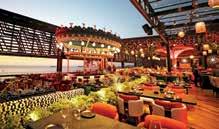
Cuisine: Japanese-Peruvian
Founded: July 2022
Country of origin: Lebanon
Owner: Tony Habre
Initial franchise fee: Upon request (info@addmind.com)
Number of branches: 1 (Lebanon) addmind.com
Celebrating the Latino Hispanic and Caribbean Creole cultures, Black Flamingo is a lively venue with a distinct Miami vibe.

Cuisine: Latin American/Caribbean
Founded: 2022
Country of origin: UAE
Owner: 7 Management
Initial franchise fee: Upon request
Number of branches: 1 (UAE) blackflamingodxb.com

With an extensive menu that caters to all tastes, Café Beirut serves it all, from allday breakfasts to a lunch menu of hot and cold mezze items, grill varieties, daily dishes and tasty options for children.
Cuisine: Lebanese
Founded: 2022
Country of origin: Lebanon
Owner: 7 Management
Initial franchise fee: Upon request
Number of branches: 2 (UAE) cafebeirutdubai.com
After more than 85 years of specialty coffee roasting, Café Younes has expanded its operations beyond Lebanon, with branches in the UAE and Egypt.
Cuisine: Specialty coffee and international cuisine
Founded: 1935
Country of origin: Lebanon
Owner: Cafe Younes Ltd
Initial franchise fee: Dependent on the location (franchise@cafeyounes.com)
Number of branches: 11 (Lebanon), 2 (UAE), 1 Egypt (a second under construction) cafeyounes.com; blackcoffee.ae

With panoramic views overlooking the Mediterranean Sea, CLAP’s rooftop promises guests breathtaking sunsets, exceptional food and mouthwatering cocktails.
Cuisine: Japanese
Founded: 2018
Country of origin: Lebanon
Owner: Tony Habre
Initial franchise fee: Upon request (info@addmind.com)
Number of branches: 1 (Lebanon), 1 (UAE), 1 (KSA) addmind.com

Em Sherif is a fine-dining Lebanese concept that offers a refined and unmatched culinary experience. The mouthwatering menu is complemented by live entertainment.
Cuisine: Lebanese
Founded: 2011
Country of origin: Lebanon
Owner: Mireille Hayek
Initial franchise fee: USD 900,000
Number of branches: 1 (Monaco), 1 (UK), 1 (Qatar), 1 (Kuwait), 1 (Syria), 1 (Lebanon) emsherif.com
Em Sherif Café is a luxury all-day dining café, offering an à la carte menu of traditional Lebanese delicacies and sumptuous bites while still maintaining the highest standards of food service quality.



Type of Cuisine: Lebanese
Founded: 2012
Country of Origin: Lebanon
Owner: Mireille Hayek
Initial franchise fee: 1st outlet: USD 700,000 / 2nd outlet: USD 500,000 / 3rd outlet: USD 300,000
Number of branches: 1 (Lebanon), 2 (Egypt), 1 (KSA), 1 (Kuwait), 2 (UAE), 1 (Iraq), 1 (Qatar) emsherif-cafe.com
Em Sherif Sea Café is a seafood concept. The à la carte menu includes fresh seafood dishes, traditional Lebanese mezze and a beef bar corner.
Cuisine: Mediterranean seafood
Founded: 2012
Country of origin: Lebanon
Owner: Mireille Hayek
Initial franchise fee: USD 750,000
Number of branches: 1 (Lebanon), 1 (Bahrain), 1 (UAE) emsherifseacafe.com
Offering ready-to-eat items, Em Sherif Deli is the newest addition to Em Sherif portfolio. It was launched inside Harrods, London.

Cuisine: Lebanese ready-to-eat items
Founded: 2022
Country of origin: Lebanon
Owner: Mireille Hayek
Initial franchise fee: USD 50,000
Number of branches: 1 (UK), Lebanon (first branch opening soon)
Habib Beirut serves traditional Lebanese cuisine, including a large selection of breakfast items, mezze and barbecue
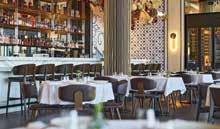
Cuisine: Lebanese
Founded: 2017
Country of origin: Lebanon
Owner: B&K Holding
Initial franchise fee: Dependent on the location
Number of branches: 5 (UAE), 2 (Iraq), 1 (Jordan), 1 (Egypt), 1 (Bulgaria), 1 (Oman) habibbeirut.com


This modern lounge bar brings an elegant, sensuous and free-spirited energy to every city it calls home.
Cuisine: International
Founded: 2011
Country of origin: Lebanon
Owner: Tony Habre
Initial franchise fee: Upon request (info@addmind.com)
Number of branches: 1 (Lebanon), 2 (UAE), 1 (KSA), 1 (Bahrain), 1 (Qatar) addmind.com
Lucia’s
This elegant restaurant, which pays homage to Capri’s morning light, is a triumph in fine dining. Expect the unexpected with Lucia’s entertainment program, because no two nights are the same.
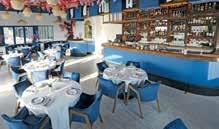

Cuisine: Italian
Founded: 2022
Country of origin: UAE
Owner: 7 Management
Initial franchise fee: Upon request
Number of branches: 1 (UAE), 1 (Qatar) luciasdubai.com
Mayrig
Mayrig was the first Armenian restaurant to open in Lebanon. It pays tribute to all the Armenian mothers, who are guardians of the nation's rich culinary heritage.
Cuisine: Armenian and Mediterranean

Founded: July 2003
Country of origin: Lebanon
Owner: Fig Holding - Aline Kamakian
Initial franchise fee: USD 700,000
Number of branches: 1 (Lebanon), 1 (Egypt), 2 (KSA), 1 (Armenia), 1 (Maldives) mayrigrestaurant.com
Sayf
Intricate modern neon décor and playful vibes combine with world-class entertainment and irresistible gastronomy to give Sayf an exceptional wild and vibrant energy.

Cuisine: International, Mediterranean
Founded: 2022
Country of origin: Lebanon
Owner: 7 Management
Initial franchise fee: Upon request
Number of branches: 1 (Lebanon), 1 (UAE) sayfdubai.com
From its traditional Greek cuisine to its fun ambience, Yamas is the place where great memories are made.
Cuisine: Greek
Founded: May 2022
Country of origin: Lebanon
Owner: Tony Habre
Initial franchise fee: Upon request (info@addmind.com)
Number of branches per country: 1 (Lebanon) addmind.com
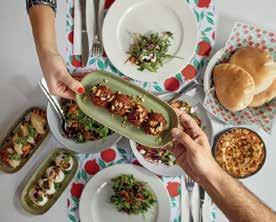



It is about time we recognized the presence of Nikkei cuisine at an international level. While the word “Nikkei” is universally accepted as a reference to Japanese immigrants and their descendants around the world, Nikkei food, on the other hand, has different connotations depending on how it is defined and by whom. What everyone can agree on is that Nikkei cuisine has managed to weave its way into the international culinary scene in the last decade or so and has already started growing roots in the Middle East.
Origins of Nikkei cuisine
Nikkei cuisine is broadly defined as Japanese-Peruvian fusion, combining Japanese techniques with Peruvian ingredients. A closer look at history reveals that this synthesis was not just a hazardous moment of innovation but rather a distinct culture that was developed over generations.
In 2019, a group of researchers said that some Peruvian gastro-elites, such as prominent chefs and culinary specialists, consider Nikkei cuisine a primarily Peruvian invention. In contrast, others believe that the Japanese workers who were offered jobs by the Peruvian government at the turn of the 20th century were the founders of the cuisine, one that was developed out of

necessity when they lacked the Japanese ingredients to cook their traditional dishes. Regardless of its origins, Nikkei cuisine’s popularization is largely attributed to two Japanese chefs: Nobu Matsuhisa, the man behind the series of Nikkei-Inspired NOBU hotels and restaurants; and Toshiro Konishi, who is said to have contributed to the interest in fusion sushi by his appearances on television.
Famous dishes and key ingredients
Ceviche — raw fish marinated in lime, spices and tiger’s milk — is said to be synonymous with Nikkei cuisine. Tiradito, a dish comprising thinly sliced raw fish with Peruvian peppers and lime juice, was invented by chef Matsuhisa and has also become a well-known Nikkei item. Other signature dishes include: carpassion (salmon carpaccio typically infused with passion-fruit syrup, watercress and crispy strips; Inca nigiri (cured tuna, yellow chilli, crispy quinoa and chalaquita — a sauce made of onions and chillies); pulpo al olivo (thinly sliced octopus with a purple olive sauce); leche de tigre (tiger’s milk — consumed as a beverage or with ceviche — essentially containing fish, citrus fruits and seasoning); acevichado (a type of maki and sauce); and Nikkei tuna tataki. Key Japanese ingredients include shoyu, miso, hondashi
or wasabi, while Peruvian components vary from Peruvian seafood and potatoes to aji (Peruvian peppers).
Nikkei and Nikkei-inspired restaurants in the MENA region
Nikkei-inspired restaurants, such as NOBU and Zuma, can be found all over the world, including the Middle East.
The UAE
Japanese food has long existed in Dubai. Today, a long list of restaurants honoring Japanese and Peruvian cuisine can be found, such as Amelia, Inti, NOBU, Kayto, Clay, Moana Seafood Restaurant, Nazcaa, Goldfish Sushi & Yakitori and Onze. Pure Peruvian restaurants, like COYA and INKA, can also be added to the list of Nikkeiinspired restaurants. The same can be said for SUSHISAMBA, which serves PeruvianBrazilian-Japanese cuisine, MAMA ZONIA (Asian-Caribbean-Latin American cuisine), Amazonico (Japanese-Latin American cuisine), BB Social Dining (modern Eastern cuisine), Clap, Mimi Kakushi and Reif Kushiyaki.
In Abu Dhabi, Niri’s menu revolves around Japanese cuisine and its spirit, while Buddha Bar Beach serves a special Nikkei brunch.
KOI was the first Nikkei restaurant to open in Riyadh. The city is also home to a number of Nikkei-inspired spots, such as MYAZU (Japanese cuisine) and COYA (Peruvian).
The most sought-after Nikkei restaurants in Jeddah are Kuuru, which launched in March 2021, and The Lucky Llama, which joined the scene in 2022 and is set to open a new branch in Riyadh by the end of 2023.
Izakaya was the first authentic Nikkei restaurant to launch in Cairo in 2015. Kazoku and Sachi are Japanese restaurants with a contemporary twist.
Qatar
COYA and Zuma have been catering to the Doha market for some time now. Nozomi, on the other hand, is a Nikkei-inspired spot that was voted the city’s “Best Japanese Restaurant 2022.”
Interestingly, many Nikkei and Nikkeiinpsired restaurants were ranked among MENA’S 50 Best Restaurants in 2022: Zuma (#2), Sachi (#5), COYA Dubai (#13) and Abu Dhabi (#34), MYAZU (#15), Reif Kushiyaki (#16), Mimi Kakushi (#20), Amazonico (#29), BB Social Dining (#33), Izakaya (#45) and Clap (#47).
Nikkei cuisine in the MENA region: success factors
The rise of Japan as a global economic power and the popularization of Japanese food in general have supported the spread of Nikkei cuisine in the Middle East. Chef Hervey Courtot, who works at NOBU
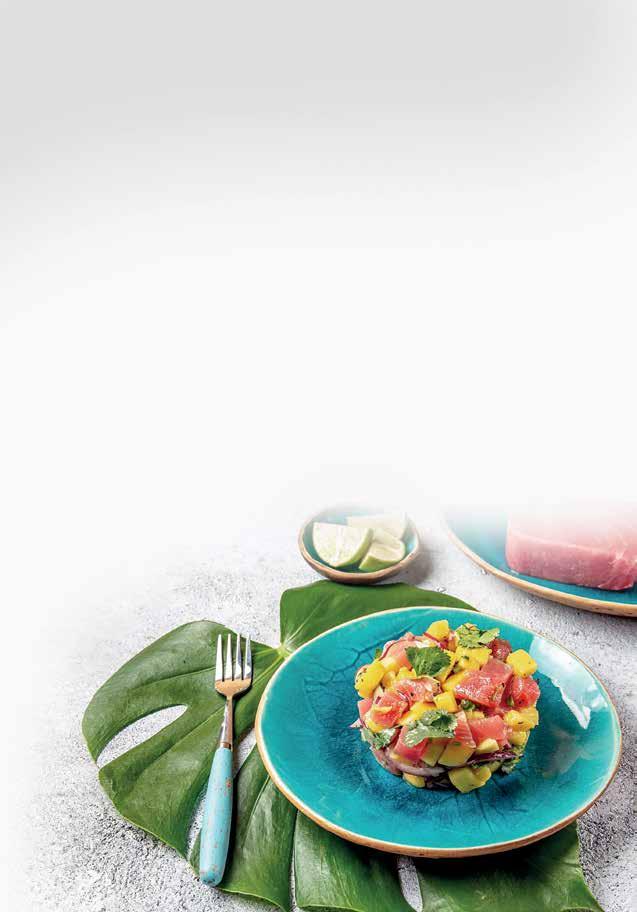
Riyadh, stated that there were no Japanese restaurants in the kingdom 20 years ago, but things have changed immensely in the last decade. The presence of Japanese restaurants in the MENA region has laid the ground for an inspired variation, since the Nikkei kitchen is partly Japanese at its core. As a result, many restaurateurs and entrepreneurs are jumping at the opportunity to enter the Nikkei market, even if it’s with only a few dishes on the menu. Other success factors are not strikingly different from the ones that made Nikkei cuisine internationally famous. In fact, it is Peru’s gastro-politics that has led the Nikkei to claim and promote Nikkei cuisine as their own. The aforementioned study, regarding the link between Nikkei cuisine and the presence of Japanese immigrants in Peru, suggests that Nikkei cuisine has found a place in Peruvian gastronomy, creating a sense of pride and belonging for many of these Japanese-Peruvians.
While Middle Eastern destinations like Dubai have always wanted to appear hip by offering a plethora of dining options, KSA and Egypt — countries with serious visions and plans for tourism — are also starting to see the benefit of investing in trendy cuisines - Nikkei in particular.
Another reason for the rise in popularity of Nikkei cuisine is related to the unique attributes of Japanese and Peruvian food. Chef Mitsuharu Tsumura, owner of the award-winning restaurant Maido in Peru, once said in an interview: “Peru is like strong salsa music and Japan is like classical music. When you mix these two things together, you create balance.” The subtlety of Japanese cuisine combined with strong Peruvian flavors creates culinary fireworks that have proven to be a hit with diners all over the world.
Perhaps the best news for entrepreneurs is that there are plenty of opportunities in this segment. However, almost all available Nikkei and Nikkei-inspired restaurants around the world cater to highend audiences, so changing consumer perceptions and creating accessible concepts are fundamental in a market that has plenty of room to grow.
amber-consulting.com
The rise of Japan as a global economic power and the popularization of Japanese food in general have supported the spread of Nikkei cuisine in the Middle East.
These days, the Middle East is serving up innovative flavors to consumers from all over the world. Naim Maadad, chief executive and founder of Gates Hospitality, discusses the region’s dynamic F&B sector and why the number of award-winning restaurants keeps on rising.

The launch of the MICHELIN Guide Dubai in 2022 was a testament to the UAE’s impressive restaurant landscape. Of course, all eyes have been on Qatar recently, and it will be interesting to see how the legacy of the FIFA World Cup continues to drive both tourism and business in the country. To cope with the demand driven by the four-week football festival, a large number of F&B venues have opened in the past six months, and I’m excited to see how they find ways to continue to evolve and differentiate.
Saudi Arabia also has ambitious plans when it comes to hospitality and tourism, so we can certainly expect expansion in the kingdom’s F&B sector.
Evolution of restaurants in the Middle East
I believe one of the best things about the Middle East is the variety of restaurants and cuisines that the region has to offer. Whether catering to tourists or residents, the Middle East boasts a melting pot of cultures and culinary delights to suit all palates. There aren’t many places in the world where you’ll find a local restaurant that serves hearty, homemade favorites next to a fine-dining restaurant that takes guests on a journey through an intricately crafted tasting menu, for example.
Restaurants have truly evolved by leveraging the diversity of the region. Such is the fast pace of the Middle East

that restaurants cannot afford to stand still, and by operating in an environment that encourages innovation and experimentation, those working in the sector continue to move forward.
F&B trends
Whether it’s cultural immersion or embracing an experience that cannot be found elsewhere, the Middle East is all about memorable moments, and the F&B scene is no different. Diners are no longer settling for a traditional dining experience; instead, they seek an ambience that complements the quality of food on offer. whether that’s live cooking classes with chefs, dining in the dark, innovative pairings or out-of-theordinary locations.
In Dubai, we recently announced an exciting collaboration with the pop-up restaurant Dasha, The Dubai Chapter. Conceived by the world-renowned chef Akira Back, the restaurant will be hosting diners for a period of six months at Jumeirah Emirates Towers. Pop-ups provide an opportunity to bring fresh and exciting experiences to the market and allow us to react to the ever-changing trends in the market. Collaborations like the aforementioned one will continue to reign in 2023, as brands work together to create something that is truly extraordinary.
Those of us familiar with the F&B scene in the Middle East have always known about the high level of culinary talent on offer; but to have the most prestigious and globally
While Dubai may have finally received the recognition it deserves, the Middle East is still only at the very beginning when it comes to the growth potential it offers.
recognized reference also acknowledge this takes things to the next level.
Transitioning from local to global, I am certain that interest from the world-famous MICHELIN Guide, Gault & Millau and World’s 50 Best — which we’ve had in the region for a while — will lead to more attention and an increase in quality, as restaurants push harder to be acknowledged. This can only be a good thing for us all, be it restaurant owners, foodies in the region or those who work within the sector.
Crucially, accolades help to retain talent in the Middle East, as younger chefs who aspire to work for MICHELIN-approved restaurants needn’t leave the region to pursue their dreams.
The future of the F&B sector Hospitality in the Middle East will always pave the future, rather than being led by it. The most exhilarating part is that while Dubai may have finally received the recognition it deserves, the Middle East is still only at the very beginning when it comes to the growth potential it offers.
Finding ways to learn from the experience in Dubai and tailor it to other areas within the region is something that is only going to enhance the Middle East further. The MICHELIN Guide and World’s 50 Best will keep the industry on its toes, with those making the cut aiming to maintain their place, while the ones who narrowly missed out wanting to make 2023 their year.
gateshospitality.com

Understanding how people consume and the way in which they interact with each other has forced hospitality design firms to adapt to meet the ever-changing needs and expectations of guests. Design practice, cultural awareness and the proper use of technology are the building blocks that form the restaurant of the future.
The virtual and physical worlds are colliding, and today technology is an accepted part of life. People consume and disseminate information within seconds. Information technology is creeping into everyday objects like cars, lamps and fridges, turning them into devices that generate data on our habits and communicate with each other across platforms.
As this happens, designers must think beyond the physical and harness the power of social networks and the rich guest-centric data that derives from the

The design of a restaurant is far more than its color palette and choice of furnishings. Design is embedded in how we interact with the spaces around us and how we feel within them. Charlotte Mindus, B2B and marketing leader at Livit, a leading design firm, guides us through the restaurant of the future.

use of technology. This data is at the core of the synergies between design, culture and technology. A close look at data can tell a vivid story about the trends, lifestyle and preferences with a given location, demographic and moment in time. Today, we find ourselves in a co-creation pattern, with our guests being active participants of our brand messaging. We can find ways to fuel consumer-generated content in a way that falls in line with this. As designers, we must then translate this into an experience for our guests that’s worth sharing.
Consumer generated content should be at the top of your list when it comes to restaurant marketing and design. We’ve seen great success in our restaurants, where touchpoints as simple as our pizza boxes garnered an unprecedented amount of social media attention. The packaging gave guests a surprising and elevated experience compared to normal pizza boxes. The result? More pizza sales at higher price points and a new marketing strategy that focused on guest participation.
Adding another layer, designers must also consider that the speed of technology has led to shorter attention spans and has made internet searches bountiful and more varied. Designers must create with the intention of grabbing end-users’ attention and keeping it.
Creating a culture of efficiency, quality service and brand attitude ranges from the hiring strategy to designing the right workflows, delivery packaging and everything in between.

Consistency is key when it comes to offering elevated quality, service and efficiency in a restaurant. But don’t be fooled; guests don’t want the same thing each and every time. Creating unique experiences for your brand will excite customers, so long as quality and service standards remain high. Our challenge is how to help brands create different experiences while maintaining a consistent brand message. As designers, a brand design guide can only take a restaurant so far. Designers can no longer create a standard “look and feel” to roll out at new locations. So how do we “unchain the chain” without creating an entirely new identity? It's critical to identify a brand essence, the image, persona, feeling your brand wants to evoke and highlight the different touchpoints in your establishment to reinforce that feeling.

Design has evolved from a classical approach of form and function to include a sense of community. This changes the role of the designer and landscape in which design practice is implemented.
Designers must look beyond the physical assets and pay greater attention to the essence of a space: be it physical or virtual. Creating a culture of efficiency, quality service and brand attitude ranges from the hiring strategy to designing the right workflows, delivery packaging and everything in between. By simplifying operations, restaurants can invest in equipment and automation that require less demanding skill sets from team members. Thus, restaurants can make recruitment choices based on personality, selecting candidates who are aligned with the brand’s values and support the brand
culture, allowing them to focus on crosstraining between front- and back-ofhouse operations and provide the best possible service to guests.





Personalization, which is in high demand, is a time-consuming service if it’s not properly integrated into the operations of a hospitality venue. Designing for more personalized experiences can go from micro to macro, gravitating toward an individual’s specific preferences to catching the next wave of trends in a subculture or region. Anticipating the next cultural shift can be achieved by referring to data and reaching sensible conclusions. It is then a case of taking action, implementing the right technology and designing a scalable concept that is flexible over time. livit.design
 V Pizza, Antwerp, Belgium
V DTLA, Los Angeles, USA
V Pizza, Antwerp, Belgium
V DTLA, Los Angeles, USA
With Italy’s culinary traditions spanning thousands of years, it’s no wonder that the Italians are so attached to their cuisine. Dario Laurenzi, CEO and founder of Laurenzi Consulting, describes the country’s F&B landscape.

In Italy, trends in the F&B sector are influenced by global ideas that promote healthier lifestyles and sustainability, as well as the rediscovery of gastronomic heritage.

A current theme that’s evident on an international scale and prominent in new forms of Italian cuisine is food sustainability. Even within the world of haute gastronomy, many Michelin-starred chefs, including the three-Michelin-star chef Niko Romito, are promoting a novel way of cooking: one that further embraces the world of vegetables to find a clean and defined taste without too many "frills" and useless refinements for the palate.
In parallel, a similar trend is developing, one that can be defined as a real "return to gastronomic origins.” Indeed, there are more and more so-called "modern trattorias,” where young chefs work on the concept of traditional cuisine but in an innovative way. Here, we find typical preparation methods that are reworked by applying new cooking techniques and iconic foods of an ancient cuisine that are ennobled.
The Italian F&B sector is undergoing a profound transformation. While the HoReCa sector in Italy has historically been fragmented, where most of the activities are carried out by family businesses or by entrepreneurs, we are observing a real reversal in recent times.
In such a market, there are still opportunities for companies wishing to structure replicable and standardized businesses. Within the hotel industry, there is scope to create unique F&B venues to allow guests to spend more time inside hotels. These venues are also being designed with locals in mind, a trend that has been observed worldwide for quite some time now.
Young chefs are using typical preparation methods that are reworked by applying new cooking techniques and iconic foods of an ancient cuisine.
The latest Italian homegrown concepts
As Laurenzi Consulting, we were recently involved in an exciting project to introduce three distinctive F&B venues to the five-star Hotel Palazzo Ripetta in Rome. The idea was to create sociable, intimate places for people to meet.
New concepts that honor age-old culinary traditions are also popping up, such as Pazzarella, an urban micro-dairy in the heart of the city of Padova, where fresh mozzarella is prepared daily by a master cheesemaker from Puglia.
Elsewhere, Mi Scusi, a brand conceptualized in 2017, aims to bring fresh pasta to the world in a fast-casual manner. It already counts more than 12 restaurants to its name.
In conclusion, the world of gastronomy in Italy is witnessing great change, and hospitality is a major part of it. It is changing in the tastes and needs of customers, but it is also shifting in light of an entrepreneurial approach behind the activities of the sector. There is much scope for growth and innovation to create a new standard and export quality concepts all over the world.

The past two years have significantly altered many of the emotional needs and expectations of the modern-day traveler. Award-winning designer Oliver Corrin, global head of interiors at Latitude, reveals the design trends that are set to define 2023.
The days of developing lifeless, cookiecutter hotel properties are behind us. Many brands and hotel owners used to be able to rely on offering their guests wellness rooms, a lobby restaurant/bar, contemporary artwork, trendy furniture, hipster music and Instagrammable F&B venues to guarantee success. However, we are seeing the rise of a new type of hotel specially created for the next generation of hotel guest; think branded lifestyle hotels that provide a new level of personalization, authentic experiences and aesthetically appealing spaces. The focus is on caring for the emotional, physical and psychological well-being of guests, far beyond the latest spa treatments.
As we look ahead and at the design trends that are likely to shape 2023, we are starting to see a shift from traditional, high-end hotel brands toward more affordable, sustainable and accessible ones. The idea of “thoughtful” design will start to overtake “luxury” design, and there is an emphasis on technology and how it is integrated and utilized by both operators and guests.
Let's take a look at some of the key trends shaping the future of hotel design in 2023 and beyond.
Adaptive hospitality

When it comes to programming within hotels, a more adaptive approach is being adopted. This entails offering guests experiences depending on their physical location within the property and their length of stay.
With new-age travelers' ever-increasing expectations, hotels must provide programs that allow guests to do more and be more in control of what they do. This can range from selecting bespoke experiences to booking a room. Hotels will now look to offer a more diverse range of experiences and activities that can be fully tailored to different demographic groups. The goal is to allow each guest to feel like they are getting what they want without always having to ask for it.
Do as the locals do
“Hyper-local” is a term we are hearing more of within the hospitality sector, whereby hotels focus on creating authentic and memorable local experiences. By doing so, they can create a sense of place by leveraging the local community and culture to create a unique identity.
These days, travelers want to eat and drink locally sourced products and interact
with local people in communities or visit destinations they have emotional connections with. In addition, they seek to connect with people who live in these cities and do things that make them feel like locals.
Luxury within nature
Properties are being developed with a focus on the outdoors and related activities, such as biking, kayaking and hiking, to name a few.
The trend initially started with a small collection of boutique hotels choosing to concentrate on the adventure and outdoor travel sectors. However, due to its success, we are now seeing more prominent hospitality brands developing hotels to appeal to wider audiences.
Hotels are providing more green, quiet spaces to complement these outdoor and adventure experiences, such as foraging trail walks and cultural hikes. These consist of courtyards, rooftop terraces and secluded gardens, allowing guests to connect with nature.
The convergence of indoor and outdoor amenities will continue to be a trend in hotel design as guests demand more immersive experiences that connect them with nature.
More than ever, we are seeing families exploring the world. This trend is expected to grow. As such, hotel designs must accommodate the needs of multigenerational families, including the provision of flexible furnishings, childfriendly spaces and loft beds. These features allow families to stay together and share more memorable experiences. Hoteliers should also review their F&B concepts and find ways to make them more child friendly, whether it's by offering more age-appropriate menu items or dedicated areas that are safe and inspiring for children.
There are also pets to consider, since more families are looking to stay at hotels where their furry companions are welcome and catered to.
Most of us can't last a day without our electronic devices, so it comes as no surprise that hotels are offering guests the option to unplug from the digital world and reconnect with themselves.
By providing quiet spaces, such as meditation rooms, reflection pods, private libraries and sound therapy rooms, hotels can encourage guests to escape the technological world.
Everyone is familiar with the concept of a food hall. It hasn't taken long for us all to realize that people love to come together in a gourmet environment to share memorable dining experiences.
These days, we are seeing larger cultural halls: venues that go beyond food and drink to offer film screenings, comedy shows, live music and more. This presents an incredible opportunity for hotel brands, especially when it comes to corporate events and social gatherings.
Food halls in the hospitality space give travelers and locals more exposure to dining, cultural and entertainment experiences in one central location. It also allows hoteliers to partner with established vendors and create additional revenue streams.
looking to continue into 2023 as operators look for an edge over their competitors.
Hotels that emphasize the importance of ethical design within their properties and outlets are likely to appeal to and attract more customers who share the same values. As a result, we are seeing travelers becoming increasingly conscious about the environments they spend time in the same way that they care about where the food they consume is sourced and how it's produced.
Going green is only seen as a step worthy of consideration for hotels by travelers but as a necessity. Hospitality designers are now responsible for sourcing and specifying more locally sourced suppliers and materials.
Ongoing global political, social and economic issues have had a massive impact on sourcing and shipping costs, and their availability. Against this backdrop, hotels are opting for more ethical and local materials to incorporate into their spaces. They want to show their guests that they care about sustainable sourcing, the environment and supporting local producers. We've seen some owners go as far as using disused shipping containers and infrastructure materials. This trend is
Hotels around the world are swapping glossy marble and plastic finishes with ethically sourced wood, stone and natural vegetation. In addition, the trend of bringing the outside in has resulted in a growing demand for more greenery within indoor spaces.
Sustainable materials, such as bamboo, are becoming more common in interior design, with designers considering that it is both aesthetically beautiful, durable and eco-friendly. Other materials rising in popularity include activated charcoal, digitally printed concrete tiles and activated cork. Once these materials were seen to be cheap, but they're now appearing in the most unexpected places and presented in the most beautiful ways imaginable.

The convergence of indoor and outdoor amenities will continue to be a trend in hotel design as guests demand more immersive experiences that connect them with nature.
As the hospitality industry becomes increasingly competitive, hoteliers must look for new ways to reach potential customers and maximize conversions, as Lovetto Nazareth, managing director of Prism Digital, explains.

Programmatic advertising is a form of digital advertising that uses AI to automate the process of targeting consumers based on intent rather than interest, as well as the real-time bidding process for buying and selling of online advertising, allowing hotels to target audiences more effectively and efficiently. It enables hotels to customize their marketing efforts based on customer data, including demographics, preferences and behavior. AI-based programmatic advertising allows hotels to further personalize their outreach and ensure that the right message reaches the right customer at the right time. In addition, it allows hotels to adjust their tactics in realtime, ensuring that they are always up to date with the latest trends and customer needs. By utilizing AI-based programmatic advertising, hotels can reach more customers and increase conversions at a lower cost, thus leading to greater return on advertising (ROA).
Benefits of AI-based programmatic advertising for hotels
- Better targeting: programmatic marketing enables marketers to reach people who have a high chance of converting. This can be done through demographic targeting, psychographic targeting and behavioral targeting.
- Programmatic buying: it’s common in programmatic advertising for a seller to buy ads through multiple ad exchanges at once. By doing this, hotels can take advantage of higher demand. If an advertiser wants to run a campaign on a specific ad network, it can bid on impressions. The price of the ad impressions will depend on how many ad networks are running that campaign.
- Real-time bidding: real-time bidding is a feature of programmatic advertising that allows advertisers to receive a price for their ads in real-time.

- Lower cost: programmatic advertising is generally less expensive than other types of ad campaigns because of their high volume.
- Improved ad quality: AI-based programmatic advertising can be used to select the best media sites to appear on, as well as determine the best ad format for each site.
- Increased automation: AI can be used to manage ad campaigns, choose the best media sites for ads and make mediabuying decisions.
The first step in implementing AI-based programmatic advertising is establishing a data-driven marketing strategy. Data is essential in giving marketers the insight they need to develop a strategy that meets their business goals. With data, marketers can determine who their target audience is
and how best to reach them. They can also determine what tone and message to use to ensure that the campaign is effective. Once marketers have developed a strategy, they can begin building their media plan. To build their plan, advertisers can use platforms that integrate AI algorithms. These platforms allow advertisers to upload their customer data to create audience segments. Based on the information in these segments, AI can make real-time bidding decisions. For example, it can determine the best price to pay for an ad impression, where to place the ad and what the ad should say.
One of the hallmarks of programmatic advertising is the ability to target customers based on their interests and behavior. This process is more effective when conducted with AI-based programmatic advertising, as AI offers more precision and control than other data harvesting techniques. Datadriven targeting allows advertisers to reach customers based on their demographic information, what websites they frequent, what content they engage with and more. AI-based programmatic advertising allows advertisers to put specific parameters around this data to ensure that their campaigns are as targeted as possible. This can include everything, from specific interests and websites to behavioral data, such as how long a customer browses for a specific item before purchasing.
By using AI-based programmatic advertising, hotels can automate many of the processes involved in ad buying and ad distribution. For example, AI can be used to decide on the best ad distribution channels, such as websites and social media platforms and
the best times to distribute ads. AI can also be used to manage ad budgets and make buying decisions based on realtime data. This enables hotels to use their budgets more wisely and improve their ad campaigns. Hotels can also use AI to schedule ad distribution. By scheduling ad distribution based on customer data, hotels can ensure that their ads are running when customers are most likely to engage with them. They can also use AI-based programmatic advertising to perform realtime analysis of customer and competitor data. This allows hotels to adjust their tactics based on changing market conditions and customer needs.
Strategies for leveraging AI-based programmatic advertising to reach more customers
- Research your customers: before implementing an AI-based programmatic advertising campaign, hoteliers should research their customers and understand what makes them tick. By understanding their customers’ demographics, interests and behavior, marketers can create more effective campaigns that reach the right people.
- Be specific when targeting: while general targeting can be useful in some situations, most marketers use specific targeting. This includes targeting based on customer data, such as what websites they visit and what content they engage with. This allows marketers to reach people who are more likely to become customers.
- Use multiple channels: it’s important to reach customers where they are. By targeting customers across multiple channels, such as websites and social media, marketers can reach a wider audience and improve their campaigns.
Any AI-based campaign will fail if the data used to create that campaign is inaccurate or incomplete. The data used to target customers and create ad campaigns must be clean and highly accurate. If the data is not accurate, customers may not receive the right message and the campaign may not be as successful as it could be. If data accuracy is subpar, customers may receive irrelevant ads or ads that don’t appeal to them. Even worse, they may not see any ads at all because the targeting parameters are too broad.
- Test different ads: when creating ad campaigns, marketers should test different ads to determine which ones are most effective. This is particularly important in AI-based programmatic campaigns, as it can help marketers determine the best ad types and messages for their customers. Testing different ads will also allow marketers to see which channels are most effective, enabling them to focus their efforts on the most profitable ads.
- Test different ad copy: after testing different ads, marketers should use the data to determine the best ad copy for those ads. This can include the headline used in the ad, the price and the offer.

- Test different targeting parameters: once marketers have determined the best ad types and ad copy to use, they should test different targeting parameters to reach the maximum number of customers possible.
- Create a focused campaign: when creating ad campaigns, marketers should aim to identify the key psychological markers that drive the target audience to take action and then create data-based flows that will allow the AI to start tracking the behavior of these data groups. Based on the learning from these activities, which are highly dependent on time and quality of the input, the AI will project the correct buyer persona for each target segment and be able to target the correct consumers with the right kind of ads that they respond to.
By utilizing AI-based programmatic advertising, hotels can reach more customers and increase conversions at a lower cost, thus leading to greater ROA.
Some of today's largest brands, including Disney, Hyatt, Microsoft, Netflix and Airbnb, were born out of recessions; they were able to shift their focus and offer a product or service long before the pandemic pivot became a thing.
“Accelerating Entrepreneurial Brand Growth” was a fascinating topic at the recent Future Hospitality Summit (FHS) in Dubai, where two inspiring entrepreneurs shared their insights on growing restaurant brands. Roaya Saleh, founder of Villa Mamas in Bahrain and London, and Fay Economides, co-owner of Mythos and Nola in Dubai, both stressed that authenticity, consistency and trust were core to establishing and growing brands.
Annick Van Overstraeten, CEO of Le Pain Quotidien, echoed these sentiments, as she took to the stage to discuss “Successfully Growing and Localizing a Global Brand.” She said: “Our brand values were defined more than 30 years ago as simplicity, authenticity, quality and conviviality, and these are all still relevant today.”
While these examples relate to food services, it is easy to see how they would apply to the wider hospitality industry, or indeed any service-based industry.
As global economic conditions continue to challenge many established businesses, entrepreneurs are finding new and innovative ways to adapt. Ashleigh Donald , co-founder of Halo Business Consulting, explores how spirited business minds are accelerating the growth of their brands.

One of the most powerful tools for entrepreneurs seeking to elevate their brand is storytelling. Stories can be shared as content on your blog, website and social media platforms or in person, where you can command greater attention for a little longer. Most importantly, the narrative must be shared with your team so that they understand, live and breathe it before it is shared with your customers.
One of the most powerful tools for entrepreneurs seeking to elevate their brand is storytelling.
How many of us read reviews of a product or service before going for it? Most figures suggest that this figure is as high as 90 percent. As consumers, it is definitely part of the decision-making process, and genuine reviews from a third party can be very influential. While a strong

story can communicate your values and your purpose, trust and authenticity are what will ultimately create the strong connection that can build long-lasting brand loyalty.
As customers, we have all become aware of loyalty programs that allow us to earn points or benefit from discounts and special offers. However, what is brand loyalty and how is it achieved?
Kevin Roberts, former CEO of Saatchi & Saatchi, said that brand loyalty was achieved through respect and love, and the three pillars of mystery, sensuality and intimacy.
We all know how powerful storytelling can be in terms of setting the scene and making things seem effortless, especially in the world of hospitality. Offering genuine experiences that inspire customers to share their positive feedback gives brands greater credibility and helps to accelerate growth.
gohalo.co.uk

A startup without a strategy is like a ship without a captain; although it may stay afloat, the destination reached is unlikely to be the one that was desired. Riky Bains , partner and brand strategist at Klinical, highlights the value of clear brand marketing strategies for hospitality startups.

All creative and operational decisions should abide by a blueprint or a brand strategy; this not only keeps the business aligned with its goals, it also prevents inconsistencies, which even the least observant guests will notice.
So, what constitutes a strong strategy?
At Klinical, over the last 12 years, we’ve realised that it must always begin with a significant bank of evidence from which conclusions can be drawn. After that, it’s about simple storytelling, testing and personalization: three fundamental ingredients for success in hospitality.
Gathering data and insights
We always start strategy exercises by conducting an in-depth interview — which should flow like a natural conversation — with the company’s key stakeholders. This allows us, the strategists, to tap into the business’ first-hand experiences, information and ambitions. Whatever the market tells us later during the research phase, we’ll need to find gaps of opportunity to plug in the objectives and personal preferences of the people who run the business.
The research phase starts immediately after the initial interview. It’s important to start with macro trends and data. For example, if the brand is based in Ghana, we will examine what’s going on in that particular country, as well as zooming out to view the regional picture. Devising a strategy and presenting it to a brand is all about creating a narrative and telling a story. In this phase, we should collate relevant information from surveys, studies and reports.
Finally, we draw conclusions and recommendations from all of the data and insights. This should all be presented in an easy-to-consume, well-designed format that anyone can pick up and understand.
As complex as the information may be, it’s fundamental that the strategy is simplified with over-arching themes. You’ll want to use taglines and metaphors to capture concepts so that they’re easy to grasp, remember and put into action. Once executed, it’s important to keep track of
performance via the relevant metrics (both quantitative and qualitative), adjusting wherever necessary.
Having worked on several hospitality projects around the world in recent years, we’ve realized that we are approaching the era of hyper-personalization. This is built on the idea that guests are half-expecting a tailored experience that begins the moment they book or reserve. If you’re a hotel brand, for example, this could mean engaging with your guests via email to understand their interests and preparing a personalized itinerary for them to enjoy when they arrive.
No brand’s situation is identical to another’s, so your strategy will be different to that of your competitors. The best way to decipher your strategy is by starting with the aforementioned process: data and insight, followed by simplification and testing. And finally, keep in mind the trend of hyper-personalization to stay ahead of the curve and increase brand loyalty.
We are approaching an era of hyper-personalization, built on the idea that guests are halfexpecting a tailored experience that begins the moment they book or reserve.
It is imperative to communicate what you expect from your employees and what you stand for as a business owner. Also, your company’s reward system must be clear enough for staff to understand how they will be compensated for their hard work.
Hiring for personality and skill
Personality is as important as skill. Finding a candidate that has both is crucial, so keep looking until you find the right person. The individual you end up hiring must be a perfect fit for your business. If you compromise, you are sending out the message to your team, as well as your customers, that you are willing to compromise on quality, products and services. That is why you need to ensure that every member of your team represents your business. Also, keep in mind that your employees — especially front-line team members — understand your business more than anyone else. Therefore, you need to get them involved in recruitment.
Building a good team
Eliminate bad elements, such as egocentric managers and gossipers. Avoid team-building exercises, as they never

There is no real secret, per se, to retaining talent; it is all about having the right attitude so that employees remain engaged, motivated and happy. We learn more with Mark Dickinson of DONE! Hospitality Training Solutions.

work. Provide learning experiences instead, because they allow employees to be the ones who teach.
Encourage open discussions and let your staff share their views on how the business could be better managed.
Being an exemplary boss
Make sure that the work environment you create is pleasant for your staff and is not toxic: no gossip, no politics and absolutely no favoritism. Always be kind, thoughtful and genuine.
Encourage open discussions and let your staff share their views on how the business could be better managed.
Constantly helping, recognizing and praising employees
Bosses need to keep their egos in check and understand that the world doesn’t revolve around them. So, for your business’s sake, be flexible and empathetic with your employees:
generous with your praise yet discreet with your dissatisfaction.
Help your employees get things right, and if they are not on the right track redirect them, as quickly as possible, toward success. Instill a sense of belief and determination in your team. You’ll be surprised by what you can accomplish when you constantly praise people and reward the high achievers. After all, people come to work because they want to earn a living, contribute to something worthwhile and feel appreciated.
Encouraging employees beyond their scope of work
Encourage your employees to earn more money and show them how to do it. Also, urge them to invest at least 10 percent of their monthly earnings and teach them how to go about doing it.
Inspire them to be more charitable by leading the way and providing opportunities for them to give to great causes.
At the end of the day, why would an employee leave a place where they feel happy, recognized and rewarded?
Eco-literacy involves the complex relationship between humans and nature. We all need to understand how natural systems work — how to conserve energy and water, how land use affects species diversity or agricultural productivity, how climate change is affecting ecosystems — and apply that knowledge in an ethical manner.
There are many growing business opportunities for eco-literate companies and organizations in today’s world. One of the greatest opportunities lies in fostering an environmentally conscious mindset. Eco-literacy combines a thorough understanding of sustainability issues with knowledge of how to make decisions that support a healthy environment. With rising awareness on climate change and its devastating effects, eco-literacy is becoming increasingly important.
It is not just business as normal; many companies are now doing their part and investing in making the world a better place. Other companies, like HeroGo, are built as impact businesses, making the planet the centerpiece of how we design our operations to not only focus on profit. This comes from three key core aspects: making sure our action as a business preserves the planet, has a positive social impact and is profitable. Moreover, becoming an eco-literate organization often leads to cost savings due to increased efficiency through better resource management practices. Examples can include utilizing more efficient technologies, reduced waste production/disposal costs and the elimination of unnecessary emissions/ pollutants from production processes amongst others.
While environmental issues continue to concern the business world, many companies are yet to adopt practices that support sustainability. Daniel Solomon , founder of HeroGo, provides some much-needed food for thought on how hospitality and F&B firms can become more eco-literate and reach zero waste.

Creating a zero-waste circular economy for your business is an ambitious goal but is achievable. For us as a business, we are built for zero-waste, fighting to eliminate food waste. However, in a broader sense, in all industries, we need to look at zero waste from a perspective where materials are reused instead of discarded, creating a closed loop of value generation and resource maintenance.
By reducing or eliminating waste through “reuse, recycle and repair” techniques, businesses can ensure their resources do not dissipate over time. This approach has many benefits: greater cost savings through efficient use of resources; better environmental stewardship as fewer raw materials are needed; improved public health outcomes due to reduced pollution; and happier customers who appreciate companies that care about sustainability.
Being eco-literate is key for those working in the hospitality or catering industries to become zero waste. Zero waste is the ultimate goal for many modern businesses that prioritize sustainability: reducing their carbon footprint and making sure they are doing all they can to protect the planet and its resources. At HeroGo, our packaging is eco-friendly and delivery is scheduled rather than on demand, which allows us
to help make society more sustainable, reduce emissions, all while keeping your food perfectly fresh and safe.

For others wishing to become more ecoliterate, here are some tips:
1. Reuse, recycle, and repurpose whenever possible. Be sure not to throw away items that could be used again; instead find ways to reuse them, such as by washing them (plastic containers and dishes), mending fabric items (tablecloths and uniforms), and upcycling furniture (tables and chairs).
2. To make things even easier for your staff, try setting up clear recycling systems throughout your place of work, such as separate bins for paper products and glassware. Display helpful signage with instructions on what goes where, specifically for food waste. Additionally, repurposing excess food scraps from kitchen prep can go into composting programs or even be used in recipes.
3. Minimize single-use products. Switch to reusable options or set up recyclable options like "return and earn" programs where customers can bring back any old containers/cups/bottles that were bought elsewhere.
4. Educate yourself and your team members on sustainability initiatives within the hospitality industry.
By reducing or eliminating waste through “reuse, recycle and repair” techniques, businesses can ensure their resources do not dissipate over time.
To address issues surrounding lactose intolerance, milk allergies and the prevalence of hypercholesterolemia, the beverage industry is constantly seeking replacements that are healthy and profitable. Nandini Roy Choudhury, client partner of F&B at Future Market Insights, uncovers the latest developments in the dairy alternatives industry.


The number of consumers requesting vegan, plant-based and organic foods and beverages is increasing for a variety of reasons, including greater awareness of lactose intolerance, ethical and environmental concerns, and health considerations. To meet demand, the Middle East's hospitality industry must provide organic, lactose-free and dairy-free dishes, and innovate around these trends.
Two significant trends have been dominating the food sector that point toward innovation in the lactose-free and dairy-free product markets: plantbased and bakery foods. Plant-based, lactose-free and dairy-free products offer a convenient substitute to regular dairy without sacrificing on nutrients. Suppliers that promote plant-based foods as lactose-free dairy substitutes are aware of the need for fortification. Major companies operating in this space have increased their selection of plant-based dairy substitutes,
including ice cream, condensed milk, non-dairy cheese and coffee creamers produced from oat, rice, soy, coconut and almonds. For instance, they emphasize that pea-based milk substitutes are fortified with vitamins A and D, and contain the same amount of calcium and protein as cow milk.
Baked solutions
Despite the focus on traditional dairybased categories, like ice cream and frozen desserts, the bakery industry continues to make the most lactose-free claims.
According to Future Market Insights, newly introduced bakery goods with lactose-free claims have increased by an average of 5.2 percent annually over the last five years. In contrast, only 0.6 percent of all newly introduced ice creams and desserts have made similar claims, with a growth rate of about 3.3 percent per year during the same period.
Some of the best lactose-free and dairy-free alternatives in the MEA region
To accelerate the introduction of plantbased substitutes that satisfy consumer preferences, new organic and natural components must be adopted while upholding the nutritional harmony of formulated goods. These may consist of:
Chia – combined with yogurt, cereal, juice, ice cream, water and smoothies. Omega 3 is abundant in chia seeds, supporting the immune system and aiding the regulation of cholesterol.
Sacha inchi – blended with organic flour, milk, smoothies, chocolate and other ingredients. Containing a high level of amino acids, up to 54 percent of important fatty acids (linoleic, linolenic, and oleic acids, referred to as Omega 3, 6, and 9), proteins (up to 29 percent) and vitamin E, this plant presents significant opportunities for the Middle East food sector over the coming years.
Lucuma – has hints of caramel and maple. It can be used instead of flour and can be added to smoothies and juices. Significant amounts of minerals, carbs, vitamins, and fiber are present. Niacin (vitamin B3), calcium and antioxidants are all present in high concentrations in this low-glycemic sweetener with significant nutritional value. Check the label
While choosing lactose-free and dairyfree products, consumers should keep a few things in mind. First, the product formulas are important. Ingredients are noted on the label, so check for lactose or dairy mentions. When ordering products from cafes or restaurants, one can inquire directly about the presence of dairy compounds. Plant-based “dairy” products are mostly colloidal suspensions or emulsions made from dissolved, as well as disintegrated, plant matter. Utilizing protein isolates or concentrates, along with other components, including sugars, oils, salts, stabilizers and flavors, may be restored using the same dairy setup. In this way, you can have the same texture as dairy products but plant based.
Another important criterion is the nutritional content. Suppliers are expected to provide consumers with products with the same nutritional content as found in their dairy and lactose equivalents.
Plant-based, lactose-free and dairy-free products offer a convenient substitute to regular dairy without sacrificing on nutrients.
The Middle East market for plantbased dairy is driven by the functional effectiveness and high sustainability promises made by such products. Consuming foods derived from animals increases the risk of heart disease, diabetes and obesity by raising fat, cholesterol and calorie levels. Thus, the market for plant-based dairy products is growing, as non-vegan consumers also turn to dairyfree foods and drinks. This increases the demand for dairy products made from soy, almond and oats.
For instance, Koita Foods introduced a new plant-based milk that is suitable for
baristas. Coconut milk, oat milk, soy milk, almond-coconut mix and almond milk are the five types of milk that are offered by this company.

Some of the most popular methods used by firms competing in the Middle East dairy-alternative industry include product innovation and growth. The UAE-based food brand Freakin Healthy added a brandnew plant-based cheese spread to its lineup of healthier products. The company decided to broaden both its client base and its product offering in the lactose-free labeled, clean and ready-to-eat market with the introduction of a cheese spread that comes in four varieties. Similarly, Tres Marias, a coffee firm in the United Arab Emirates, introduced a new plant-based milk line of products, known as Oat Barista and Soy Barista.
While plant-based is considered "healthy,” commercial products vary greatly in their nutritional profiles, with some containing relatively low protein and only a few minerals. Manufacturers in the Middle East must take into account protein quantity and quality, as well as fortification, if these goods are to be considered as alternatives to cow milk, and regulatory authorities must standardize these factors.
While allergies, health concerns and environmental considerations have led to a worldwide increase in dairyfree alternatives, many consumers continue to opt for traditional dairy products. Natalya Latypova, managing director of Glee Hospitality Solutions, examines the state of the industry and the major trends shaping it.

The practice of dairy farming extends back thousands of years, but it wasn’t until the 20th century that we saw the massive innovation that transformed dairy farming into the large-scale operation it is today.
According to Statista, the global dairy market is valued at USD 871 billion and is projected to grow to USD 1.13 trillion by 2026. However, in light of evolving customer tastes and the emergence of factors that have affected both the dairy market and the farming process itself, a number of trends have become evident in recent years that are directing the flow of this global multibillion-dollar industry.

Two key trends have emerged in recent years. On the one hand, it is evident that global demand for dairy-free products has steadily increased, owing to a number of factors that include, among others, the rise of veganism. Dairy-free alternatives, such as soy, oat and almond, have all witnessed market growth, fueled by innovations that have made them more convincing in terms of taste and
appearance. An increase in customer demand for sustainable sources of farming and health have also driven demand for dairy-free alternatives, with large-scale farming having increasingly come under public scrutiny.
With the advent of the internet and greater awareness of the impact of large-scale farming, higher numbers of concerns are being raised about dairy farms suspected of contributing negatively to the environment. However, there has also been a rise in demand for traditional high-quality dairy and smallbatch items, such as artisan cheese.
According to the Dairy Food Global Market Opportunities And Strategies To 2031: COVID-19 Impact And Recovery report, despite processed cheese being the largest segment of the cheese market by type, accounting for 63.7 percent of the total market in 2021, the natural cheese market is expected to be the fastest-growing segment, growing at a CAGR of 9.2 percent during 2021-2026. As mentioned previously, the traditions of dairy farming go back thousands of
years; in certain regions of Italy, France and elsewhere, there are entire recipes and time-honored practices that revolve around authentically sourced and prepared dairy ingredients. Cheeses like authentic buffalo mozzarella and ricotta are integral to authentic Italian cuisine and will always be sought after as the sole components of ‘’true’’ recipes of the highest caliber.
A trend that in part addresses both the aforementioned issues, namely the concern for sustainable farming, while remaining true to long-established culinary traditions, is micro farming. With micro farming, dairy farmers are now able to build a farming structure that focuses on the well-being of their livestock and a sustainable output, while providing a high-quality product that addresses many of the concerns of the modern consumer. This ties in with heightened demand for organic produce over conventionally sourced nonorganic items. Customers want to know that they are getting their dairy products from sources that promote and advocate
sustainability and quality over profitability and generic mass production.
Small batch production has seen an increase across various industries and has begun to take serious strides in the provision of small batch dairy produce, such as yogurt, cheese and even items like cheesecake. Much like micro farming, small batch production favors smaller scale, higher quality products that are able to earn greater trust from sustainability-conscious consumers.
The growing perception that dairy products promote better health has, ultimately, generated higher demand in the market.
The pandemic forced us focus on our well-being and rethink our bad habits. These days, gut health is a topic we hear a lot about, and many of us are aware of the way in which improving it can decrease the onset of various ailments that include heart disease and hypertension.
Several dairy products, such as yogurt, contain probiotics that are great for gut health. Furthermore, protein, calcium and vitamins can be found in milk and cheese.

The growing perception that dairy products promote better health has, ultimately, generated higher demand in the market.
In spite of the rise in dairy-free alternatives, there are still opportunities in the dairy segment that can be leveraged. The challenge lies in understanding that sustainability now stands at the forefront of consumers’ minds, and it is imperative for the dairy industry to ensure that these concerns are addressed. High-quality dairy products that reflect authenticity and integrity are popular nowadays, and form part of a prominent trend that can be explored further. Customer perception may be seen as the driving force for the future of the dairy industry, so the essential components that bolster demand need to incorporate greater health benefits, sustainability and trust, above all else.
Choosing the right equipment is fundamental to achieving success in hospitality. Innovative and unique technology can be extremely practical and efficient, as we discover with Helge Peter Pahlke FCSI, managing partner at KDREI.

In recent years, multifunctional cooking appliances have become popular due to the flexibility they offer. Combining multiple cooking functions in one, these modern and versatile machines take over several preparation methods at once, including roasting, baking, deepfrying, steaming, grilling and gratinating. In addition, they are easy to handle, operate and clean, and environmentally friendly in terms of electricity and water consumption.
Here’s a small glimpse of the upcoming trends that I believe will be shaping the hospitality industry:

Chill the glass out!
Hygiene has become a focus since the pandemic began. Indeed, all industries have been scrutinized in terms of how they deal with hygiene practices.
Frucosol’s innovative glass froster allows instant cooling of any type of glass. Not only is it slick and compact, the froster’s unique technology enhances the taste of any drink, as it doesn't add any flavor and allows the ice to melt. It is the ideal accessory for chilling champagne flutes and white wine. Furthermore, it assists the service industry with hygiene, as the glasses are sterilized throughout the freezing process. Simply put, it boosts service quality at a lower cost.
A single oven that performs the job of three
Many of the latest innovations in foodservice center on single appliances that use the Internet of Things or cloud-based systems. Thanks to the integration of two or three chambers, it is possible to roast, bake, steam and grill simultaneously. These multifunctional ovens do not require a vent in most situations and reduce the need for connected loads, accelerating cooking capabilities using the patented structured air technology.
Alto-Shaam’s Converge Multi-Cook ovens are a great example, allowing users to steam, air-fry, bake and grill at the same time in up to three independent chambers.

A single surface for all Hupfer’s revolutionary hot and cold plates make it possible to switch between hot and cold dishes within a short period of time on a single surface. For instance, it is possible to shift from 25 degrees to 90 degrees in two minutes.
In terms of design, consultants and operators can choose from several options — with or without a stainlesssteel frame, a glass plate for keeping dishes hot or cold, or the new Dekton work surface, which is available in various finishes. With the clever twoin-one solution from Hupfer, buffet planning can be achieved in the smallest of spaces.
Automatic cleaning system for skillet pans without chemicals
MKN's FlexiChef sets a new milestone in hygiene thanks to SpaceClean, which removes the need for tedious and time-consuming cleaning of the skillet pan. SpaceClean is the first automatic cleaning system for pans and a new feature for FlexiChef. A chemical-free solution, it uses up to 70 percent less water than manual methods, hygienically cleaning the pan in just two minutes (excluding setup time). This automatic cleaning system uses just 26 liters of water to clean the pan.
Until recently, cleaning in kitchens was a time-consuming activity that was often seen as a burden for staff. SpaceClean cleans the pan with almost no effort, helping to increase productivity and boost employee morale. The SpaceClean cleaning system also supports commercial goals, saving approximately 190 hours of work time each year. When multiplying this by an average employee’s salary, SpaceClean pays for itself in the first year. In addition, cleaning costs are eliminated, as intermediate cleaning with SpaceClean requires no chemicals.
The PerformAir Hood embodies GINOX’s pioneering and innovative spirit. Since the company developed its first-generation self-cleaning hoods, Swiss technology has evolved in an environmentally sustainable direction to meet the needs of our planet. The patented EcoClean biotechnological cleaning solution and clay ball filtration remove all grease from the discharged air.
This is further enhanced by an innovative double intake panel system, which naturally increases the efficiency of the hood and halves the annual maintenance costs for the ventilation equipment. The GINOX PerformAir Hood substantially improves fire safety with its patented, TUV-certified clay ball filter.
Not your ordinary GN container Rieber's Thermoplate is a new design of GN pan, made with thermal highly functional SWISS-PLY multilayer material. With the inner aluminum core between two stainless steel layers, the SWISS-PLY multilayer material achieves conductivity levels up to 10 times higher than pure stainless steel.
Further sustainable contributions are made with the self-cleaning automated control cabinet. The GINOX cabinet drastically reduces daily water consumption and can control up to nine hoods independently. The wash cycle is fully programmable according to the operational requirements, and an additional layer of fire safety can be added with a “mist on demand” function, perfect for solid-fuel cooking applications. The mist option cools the exhaust plenum, which further improves air efficiency.
Many of the latest innovations in foodservice center on single appliances that use the Internet of Things or cloudbased systems.
There’s always an excuse to celebrate, and what better way than with this tasty recipe by Romain Renard, regional head of Callebaut’s Chocolate Academy Centers in the MENA region.

VEGAN SABLE CACAO DOUGH
Ingredients
180g icing sugar
200g vegan butter
420g flour
20g corn starch
40g Callebaut Cocoa Powder CP
80ml water
Preparation
Sift the icing sugar. Add the vegan butter and mix well. Add the flour, corn starch and Callebaut Cocoa Powder CP. Gradually pour in the water to obtain a sable texture.
COCOA FRANGIPANE
Ingredients
80g flour
4g sodium bicarbonate
7g baking powder
90g almond flour
30g Callebaut cocoa powder
80g inverted sugar
45ml grapeseed oil
140ml coconut milk
45ml coconut oil
Preparation
In the RoboCoupe mix all the ingredients for the cocoa frangipane.
PASSION FRUIT-BANANA MARMALADE
Ingredients
250g banana purée
50g passion fruit purée
50g glucose

70g sugar
10g pectin NH
Preparation
Heat the banana purée, passion fruit purée and glucose. Add the sugar and pectin NH once the mixture reaches 40 degrees. Bring to the boil and turn off the heat.
VEGAN DARK CHOCOLATE MOUSSE
Ingredients
50ml soy milk
200g Callebaut NXT Dairy-Free Dark Chocolate DFD-55 430g semi-whipped vegan cream
Preparation
Boil the soy milk. Melt and mix in the Callebaut NXT Dairy-Free Dark Chocolate. Add the semi-whipped vegan cream.
VEGAN DARK CHOCOLATE GLACAGE
Ingredients
62.5g sugar
1.5g pectin NH
150ml soy milk
62.5g sugar
150g glucose
250g Callebaut NXT Dairy-Free Dark Chocolate DFD-55
Preparation
For the glacage, mix the sugar and pectin NH. Warm up the soy milk and the glucose at 40 degrees. Add the sugar/pectin and boil. Pour over the Callebaut NXT Dairy-Free Dark Chocolate and mix. Rest overnight in the fridge.
Melt the following day at 40 degrees and mix. Use at 30 degrees.
EMF Middle East
t. +961 9 938732 | info@emf-me.com www.emf-me.com
Invest in the right products and equipment to make cooking and other functions easier. Here’s a good place to start.
Milkadamia debuts its multi-serve Milk Tea. Milkadamia’s new ready-to-drink, lightly sweetened Milk Tea features black tea and the brand’s smooth macadamia milk.
The tea is richly layered and complex yet refreshing.
The Milk Tea is packaged in 32oz cartons rather than unsustainable, more costly single-serve packaging. milkadamia.com

The company uses a unique cold brew espresso recipe and blend with ingredients, spices and botanicals from around the world to create its own take on the Espresso Martini. It is subtle and sophisticated, but not too sweet. drinkmocktails.co.uk

So Delicious Dairy Free unveils coconut milk yogurts with botanical extracts, available in three flavors: strawberry with elderberry extract; mango with ginger and turmeric extracts; and mixed berry with chamomile extract.

The range contains 7-8g of sugar and no artificial sweeteners or preservatives. sodeliciousdairyfree.com
The Simple Root's new range of dairyfree, vegetable-based cheeses is made from potatoes, sweet potatoes and parsnips. The cheeses have excellent melting properties and are produced using a special technique, resulting in a product that is lower in fat and salt than its competitors.
thesimpleroot.co.uk
General Mills is launching Bold Cultr Cream Cheese, a lactose-free, next-gen cream cheese alternative. The cream cheese is available in a plain variety for now, with plans to release additional flavors, such as onion & chive, and strawberry. boldcultrfoods.com




Alamance Foods has launched Whipt – a dairy-free whipped cream, available in three varieties: coconut, almond and oat. Whether you want the perfect puff of oat, almond's hint of marzipan, or the creaminess of coconut, each variety has the texture you've come to expect from a satisfying dessert.
whiptdream.com

Plant-based pioneer Plenish has expanded into plant-based milks and immunity-boosting juices shots. Their latest launches are a green juice, named Rise, and Cherish, a cacao m*lk substitute. Rise combines pineapple and pear with spinach, cucumber and a zing of lime. Cherish cacao m*lk is made with cacao and vanilla beans, blended with dates and Himalayan salt. plenishdrinks.com
Nurishh’s animal-free cream cheese alternative tastes just as good as traditional cream cheese because it contains real dairy proteins. Created in partnership with Perfect Day, Nurishh Incredible Dairy is made with precision fermentation and is lactose-free. Consumers are now able to try greener animal-free cream cheese and make a delicious choice for the future of the planet.
nurishh.co.uk

Violife Just Like Sour Cream offers a dairy-free creamy, rich and tangy taste. The product can be used in all recipes that require sour cream – from creamy stuffed potatoes to pound cakes – and can also be used to top dishes such as nachos, tacos and chili.
violifefoods.com




Bringing together F&B communities from across the world in Dubai to chart the way forward for this rapidly evolving sector, the 28th edition of Gulfood is set to be 30% larger than the previous years, with over 1,500 exhibitors new to the show this year.
THE GLOBAL FOCAL POINT FOR TRANSFORMATION IN FOOD










